Elie Wiesel's 'This I Believe': A God who remembers

I remember, May 1944: I was 15-and-a-half, and I was thrown into a haunted universe where the story of the human adventure seemed to swing irrevocably between horror and malediction. I remember, I remember because I was there with my father. I was still living with him there. We worked together. We returned to the camp together. We stayed in the same block. We slept in the same box. We shared bread and soup. Never were we so close to one another.
We talked a lot to each other, especially in the evenings, but never of death. I believed — I hoped — that I would not survive him, not even for one day. Without saying it to him, I thought I was the last of our line. With him, our past would die; with me, our future.
The moment the war ended, I believed — we all did — that anyone who survived death must bear witness. Some of us even believed that they survived in order to become witnesses. But then I knew deep down that it would be impossible to communicate the entire story. Nobody can. I personally decided to wait, to see during 10 years if I would be capable to find the proper words, the proper pace, the proper melody or maybe even the proper silence to describe the ineffable.
For in my tradition, as a Jew, I believe that whatever we receive we must share. When we endure an experience, the experience cannot stay with me alone. It must be opened, it must become an offering, it must be deepened and given and shared. And of course I am afraid that memories suppressed could come back with a fury, which is dangerous to all human beings, not only to those who directly were participants but to people everywhere, to the world, for everyone. So, therefore, those memories that are discarded, shamed, somehow they may come back in different ways — disguised, perhaps seeking another outlet.

Create a More Connected Minnesota
MPR News is your trusted resource for the news you need. With your support, MPR News brings accessible, courageous journalism and authentic conversation to everyone - free of paywalls and barriers. Your gift makes a difference.
Granted, our task is to inform. But information must be transformed into knowledge, knowledge into sensitivity and sensitivity into commitment.
How can we therefore speak, unless we believe that our words have meaning, that our words will help others to prevent my past from becoming another person's — another peoples' — future. Yes, our stories are essential — essential to memory. I believe that the witnesses, especially the survivors, have the most important role. They can simply say, in the words of the prophet, "I was there."
What is a witness if not someone who has a tale to tell and lives only with one haunting desire: to tell it. Without memory, there is no culture. Without memory, there would be no civilization, no society, no future.
After all, God is God because he remembers.
Independently produced for All Things Considered by Jay Allison and Dan Gediman with John Gregory and Viki Merrick. Copyright 2019 NPR. To see more, visit https://www.npr.org.
We will keep fighting for all libraries - stand with us!
Internet Archive Audio

- This Just In
- Grateful Dead
- Old Time Radio
- 78 RPMs and Cylinder Recordings
- Audio Books & Poetry
- Computers, Technology and Science
- Music, Arts & Culture
- News & Public Affairs
- Spirituality & Religion
- Radio News Archive

- Flickr Commons
- Occupy Wall Street Flickr
- NASA Images
- Solar System Collection
- Ames Research Center

- All Software
- Old School Emulation
- MS-DOS Games
- Historical Software
- Classic PC Games
- Software Library
- Kodi Archive and Support File
- Vintage Software
- CD-ROM Software
- CD-ROM Software Library
- Software Sites
- Tucows Software Library
- Shareware CD-ROMs
- Software Capsules Compilation
- CD-ROM Images
- ZX Spectrum
- DOOM Level CD

- Smithsonian Libraries
- FEDLINK (US)
- Lincoln Collection
- American Libraries
- Canadian Libraries
- Universal Library
- Project Gutenberg
- Children's Library
- Biodiversity Heritage Library
- Books by Language
- Additional Collections

- Prelinger Archives
- Democracy Now!
- Occupy Wall Street
- TV NSA Clip Library
- Animation & Cartoons
- Arts & Music
- Computers & Technology
- Cultural & Academic Films
- Ephemeral Films
- Sports Videos
- Videogame Videos
- Youth Media
Search the history of over 866 billion web pages on the Internet.
Mobile Apps
- Wayback Machine (iOS)
- Wayback Machine (Android)
Browser Extensions
Archive-it subscription.
- Explore the Collections
- Build Collections
Save Page Now
Capture a web page as it appears now for use as a trusted citation in the future.
Please enter a valid web address
- Donate Donate icon An illustration of a heart shape
This I believe : the personal philosophies of remarkable men and women
Bookreader item preview, share or embed this item, flag this item for.
- Graphic Violence
- Explicit Sexual Content
- Hate Speech
- Misinformation/Disinformation
- Marketing/Phishing/Advertising
- Misleading/Inaccurate/Missing Metadata
![[WorldCat (this item)] [WorldCat (this item)]](https://archive.org/images/worldcat-small.png)
plus-circle Add Review comment Reviews
7 Favorites
Better World Books
DOWNLOAD OPTIONS
No suitable files to display here.
IN COLLECTIONS
Uploaded by station65.cebu on March 29, 2021
This I believe
The personal philosophies of remarkable men and women, by jay allison , dan gediman , and john gregory.
- ★ ★ ★ ★ ★ 5.00 ·
- 27 Want to read
- 4 Currently reading
- 1 Have read
![this i believe essay god This I believe by edited by Jay Allison and Dan Gediman ; with John Gregory and Viki Merrick ; photographs by Nubar Alexanian ; editorial team, Gladys Chang Hardy ... [et al.].](https://covers.openlibrary.org/b/id/11040894-L.jpg)
Preview Book
My Reading Lists:
Use this Work
Create a new list
My book notes.
My private notes about this edition:
Check nearby libraries
- Library.link
Buy this book
Based on the NPR series of the same name, the bestselling This I Believe features eighty essayists - from the famous to the previously unknown -- completing the thought that begins the book's title. Each piece compels us to rethink not only how we have arrived at our own personal beliefs but also the extent to which we chare them with others. The result is a stirring and provocative trip inside the minds and hearts of a diverse group of people whose beliefs - and the remarkably varied ways in which they choose to express them - reveal the American spirit at its best.
Previews available in: English
Showing 4 featured editions. View all 4 editions?
Add another edition?
Book Details
Published in, table of contents, edition notes.
Includes bibliographical references.
Classifications
External links.
- Contributor biographical information
- Publisher description
- Sample text
- Table of contents only
The Physical Object
Community reviews (0).
- Created September 27, 2008
- 16 revisions
Wikipedia citation
Copy and paste this code into your Wikipedia page. Need help ?
- Skip to main content
- Keyboard shortcuts for audio player
This I Believe
The god who embraced me.
John W. Fountain
I believe in God. Not that cosmic, intangible spirit-in-the-sky that Mama told me as a little boy "always was and always will be." But the God who embraced me when Daddy disappeared from our lives -- from my life at age four -- the night police led him away from our front door, down the stairs in handcuffs.
The God who warmed me when we could see our breath inside our freezing apartment, where the gas was disconnected in the dead of another wind-whipped Chicago winter, and there was no food, little hope and no hot water.

John W. Fountain is a professor of journalism at the University of Illinois at Urbana-Champaign. He has been a reporter for The Chicago Tribune and The Washington Post , and a national correspondent for The New York Times . Fountain is also the author of True Vine: A Young Black Man's Journey of Faith, Hope, and Clarity .
The God who held my hand when I witnessed boys in my 'hood swallowed by the elements, by death and by hopelessness; who claimed me when I felt like "no-man's son," amid the absence of any man to wrap his arms around me and tell me, "everything's going to be okay," to speak proudly of me, to call me son.
I believe in God, God the Father, embodied in his Son Jesus Christ. The God who allowed me to feel His presence -- whether by the warmth that filled my belly like hot chocolate on a cold afternoon, or that voice, whenever I found myself in the tempest of life's storms, telling me (even when I was told I was "nothing") that I was something , that I was His, and that even amid the desertion of the man who gave me his name and DNA and little else, I might find in Him sustenance.
I believe in God, the God who I have come to know as father, as Abba -- Daddy.
I always envied boys I saw walking hand-in-hand with their fathers. I thirsted for the conversations fathers and sons have about the birds and the bees, or about nothing at all -- simply feeling his breath, heartbeat, presence. As a boy, I used to sit on the front porch watching the cars roll by, imagining that one day one would park and the man getting out would be my daddy . But it never happened.
When I was 18, I could find no tears that Alabama winter's evening in January 1979 as I stood finally -- face to face -- with my father lying cold in a casket, his eyes sealed, his heart no longer beating, his breath forever stilled. Killed in a car accident, he died drunk, leaving me hobbled by the sorrow of years of fatherlessness.
By then, it had been years since Mama had summoned the police to our apartment that night, fearing that Daddy might hurt her -- hit her -- again. Finally, his alcoholism consumed what good there was of him until it swallowed him whole.
It wasn't until many years later, standing over my father's grave for a long overdue conversation, that my tears flowed. I told him about the man I had become. I told him about how much I wished he had been in my life. And I realized fully that in his absence, I had found another. Or that He -- God, the Father, God, my Father -- had found me.
More 'This I Believe' Essays
Penn jillette: there is no god, kathy dahlen: the elusive yet holy core, ruth kamps: living life with 'grace and elegant treeness', related npr stories, commentary: john fountain's renewed faith.

- Sermon Index
- Sermon Series
- Sermon Topics
- Sermon Scriptures
- Good Words for Today
- Let’s Read the Bible!
- General Ministry
- 7 Focus Areas
- Ray Pritchard
- Mark Pritchard
- 2024 Travel Schedule
- Board of Directors
- Anchor Project
- China Resource Library
- Non-Cash Giving
- Planned Giving

Thanks for your interest! Sign up to join over 20,000 subscribers receiving our weekly sermon email.
Why I Believe in God
Genesis 1:1.
September 30, 2009 | Ray Pritchard
Listen to this Sermon
The Bible never argues for the existence of God.
It begins instead with a simple, majestic sentence: “In the beginning God created the heavens and the earth” (Genesis 1:1). The Bible begins with a declaration, not with an argument.
There is a God who created all things.
If you do not start there, you will miss the central truth of the universe . That’s what Proverbs 1:7 means when it says that “the fear of the Lord is the beginning of knowledge.” Note the two beginnings here:
“In the beginning God.” “The beginning of knowledge.”
This leads us in a particular direction:
1. All things begin with God. 2. All knowledge begins with God.
It is in precisely this sense that the Bible proclaims that those who deny God are “fools” (Psalms 14:1). This stands as a moral judgment, not a statement about IQ or educational attainment. A very smart person can drive off a cliff and be smashed on the rocks. That’s the sort of folly the psalmist has in mind . If you leave God out of the calculation, you have missed the central fact of the universe. You are wrong at the very core of life, and therefore life itself will remain a mystery to you.
If you leave God out of the calculation, you have missed the central fact of the universe. </h6 class=”pullquote”>
Did you know that today (September 30, 2009) is the first-ever International Blasphemy Day ? I didn’t either until I read about it on Al Mohler’s weblog. This “celebration” includes an invitation for people to “blaspheme the Holy Spirit” (see Mark 3:29) by making a video renouncing their Christian beliefs and saying, “I deny the Holy Spirit,” thus daring God to punish them. You can find a host of these videos on YouTube where ex-Christians (many of them young people) renounce their faith and invite God to judge them.
There are a number of ways to respond to this, and the least effective would be to get angry . Those of us who believe in God need not be threatened by those who do not believe or by former believers who now are doubters or agnostics or atheists. I do think it is sad to consider young people raised in the church who now find it necessary to publicly renounce a faith that never really took hold.
Consider two simple words. God is. That’s the central fact of the universe . Miss that and you can be right about a lot of other things and still be wrong where it matters most. With that in mind, let’s think together about five facts relating to God’s existence.
1. God has made himself known to every person.
Romans 1:19-20 says it very clearly.
Since what may be known about God is plain to them , because God has made it plain to them . For since the creation of the world God’s invisible qualities-his eternal power and divine nature-have been clearly seen , being understood from what has been made, so that men are without excuse.
God has revealed himself so clearly that no one can miss it. Even though men suppress the truth about God (v. 18), they cannot completely obliterate the message. It is “plain” and “clearly seen” both in nature and in conscience. This plainly-seen revelation of God in nature has been available “since the creation of the world.” That means Adam saw it, Cain saw it, Noah saw it, Abraham saw it, Jacob saw it, Moses saw it, David saw it, and every other person who has ever lived since the beginning of time saw it. Don’t miss this point. Everyone knows something about God! No one has ever lived who missed this revelation. It doesn’t matter whether they consciously thought about it or not. The truth was there for all to see, so plainly laid out that no one could miss it. That means it doesn’t matter whether you were a headhunter on some South Pacific island or an upscale yuppie in Miami. No one could miss the truth about God . . . and no one has ever missed it because God made the truth about himself as plain as day.
Everyone knows something about God! </h6 class=”pullquote”>
2. something about god “gets through” to every person..
In the second half of verse 20 Paul comments that the truth of God in nature has been “clearly seen, being understood from what has been made.” Those two verbs are exceedingly important. “Clearly seen” means that everyone has seen something of God’s handiwork in the world. “Understood” is even stronger. It means that the revelation of God in nature strikes the heart of every man. Paul is not suggesting that nature contains a revelation about God which every man may see. That’s not strong enough. To the contrary, Paul is saying that every man actually sees the revelation and every man actually understands it to some degree.
No one can ever say, “I didn’t know” or “You didn’t make it clear,” because God made it abundantly and overwhelmingly clear.
“Lord, you have made us for yourself. Our hearts are restless until they find rest in you.” </h6 class=”pullquote”>
That explains why every culture on earth has some conception of a Supreme Being-however flawed it might be. Man was made to look for answers outside of himself. He is incurably religious in that sense. The French philosopher Pascal said that inside the heart of every man there is a “God-shaped vacuum.” And Augustine said, “Lord, you have made us for yourself. Our hearts are restless until they find rest in you.” Ecclesiastes 3:11 says that God has put “eternity in the hearts of men,” meaning that the longing for ultimate answers comes from God himself. God put that longing (the “God-shaped vacuum”) inside the human heart to cause men to look to him.
3. Creation testifies to the Creator.
Psalm 19:1 says that “the heavens declare the glory of God; the skies proclaim the work of his hands.” Now either you see this or you don’t. Some people, brilliant scientists, can study the stars for a lifetime and come away saying, “There is no God.” But others will see the mighty Milky Way and say, “There must be a God!” Psalm 19:1 means that God has not left us any room to doubt. The heavens preach a sermon about the wonders of our great God. “Day after day they pour forth speech; night after night they display knowledge” (Psalm 19:2). God so arranged the universe that light from heaven streams in on every side. You have to cover your face not to see it.
A week ago I flew to Washington state in the Pacific Northwest, to a little town near the Canadian border called Sumas. To my surprise (because I had never been there before), the whole area is a verdant paradise. Because of the abundant rainfall, it is actually a lush rainforest. For two days I spoke to pastors (most of them from British Columbia) at Cedar Springs Conference Center. On my final day there, John Bargen, the founder of the conference center, picked me up in his ATV and took me for a ride so I could see the massive cedar trees that cover the property. At one point we got out of the ATV, and John took out a tape measure and walked all the way around the most massive cedar tree I had ever seen. It turned out to be 18 feet in circumference and towered 130 feet above us, creating a massive green canopy overhead. John said the tree was probably 200 years old. As we made our way back to the main lodge, he showed me the beautiful gardens they had planted over the last 35 years. Then I saw that someone had planted flowers in a certain pattern on the hillside:
God Bless You
Now suppose that someone came hiking up the mountainside and saw “God Bless You” spelled out in beautiful flowers. They might conclude that this was a fantastic freak of nature, that somehow the flowers had come together entirely by chance to spell those three words. It could happen. If 10,000 monkeys typing for 100 million years could produce Shakespeare, then presumably the flowers could randomly spell out “God Bless You.”
You are free to believe that if you like. And you can also presume that millions of years of wind and rain and erosion produced the faces of Washington, Jefferson, Lincoln and Roosevelt on Mount Rushmore.
If 10,000 monkeys typing for 100 million years could produce Shakespeare, then presumably the flowers could randomly spell out “God Bless You.” </h6 class=”pullquote”>
Opinions are free . Think what you want. But I prefer to believe that just as loving hands planted the flowers at Cedars Springs, and wise hands carved the faces on Mount Rushmore, even so the hands of Almighty God carefully crafted the universe.
You either see that or you don’t. That doesn’t prove God. But just as a watch points to a watchmaker, just as Mt. Rushmore points to a dedicated architect, just as The Old Man and the Sea points to Ernest Hemingway, the beauty and order and complexity of the universe points directly to Almighty God, the Ultimate Designer of all things.
Psalm 8:3 says, “When I consider the heavens, the work of your fingers, the moon and the stars, which you have set in place.” God has left his fingerprints on the universe. Every rock, every tree, every river, every ocean, every star in the sky-they all bear the Divine DNA that points back to the God who created all things.
This world is God’s house. He’s left clues everywhere about what kind of God he is . </h6 class=”pullquote”>
This world is God’s house. He’s left clues everywhere about what kind of God he is . When you stand at the Grand Canyon, you can’t help but be overwhelmed at the power of God to create such magnificence. He must have had a mighty hand to scoop out the Royal Gorge in Colorado. He is as infinite as the dark recesses of the mighty Atlantic Ocean. Each snowflake testifies to his uniqueness. The changing colors of the Great Smoky Mountains proclaim his creativity.
The galaxies shout out, “He is there.” The wildflowers sing together, “He is there.” The rippling brooks join in, “He is there.” The birds sing it, the lions roar it, the fish write it in the oceans-“He is there.” All creation joins to sing his praise. The heavens declare it, the earth repeats it and the wind whispers it-“He is there.” Deep cries out to deep, the mighty sequoia tells it to the eagle who soars overhead, the lamb and the wolf agree on this one thing-“He is there.”
No one can miss the message. God has left his fingerprints all over this world . Truly, “This is my Father’s world,” and every rock, every twig, every river and every mountain bears his signature. He signed his name to everything he made. The earth is marked “Made By God” in letters so big that no one fails to see it.
Some people may deny it, but no one fails to see it.
4. Some choose not to believe because they are spiritually blind.
Unbelief is a moral choice not to believe the evidence God has placed all around us . Recently the Wall Street Journal asked Karen Armstrong and Richard Dawkins to independently answer the question, “Where does evolution leave God?” Titled Man vs. God , the discussion starts with the assumption that evolution as an explanation for the universe must in fact be true. If so, where does God fit in? Karen Armstrong says we still need the idea of God even though evolution has demolished any need for the reality of a personal God:
Human beings were not the pinnacle of a purposeful creation; like everything else, they evolved by trial and error and God had no direct hand in their making. No wonder so many fundamentalist Christians find their faith shaken to the core.
The earth is marked “Made By God” in letters so big that no one fails to see it. </h6 class=”pullquote”>
But if that is true, why retain even the idea of God? Dawkins follows this to its logical conclusion:
Where does that leave God? The kindest thing to say is that it leaves him with nothing to do, and no achievements that might attract our praise, our worship or our fear. Evolution is God’s redundancy notice, his pink slip. But we have to go further. A complex creative intelligence with nothing to do is not just redundant. A divine designer is all but ruled out by the consideration that he must at least as complex as the entities he was wheeled out to explain. God is not dead. He was never alive in the first place.
For the record, I think Dawkins is right. If naturalistic evolution is true, then there really is no room for God, and no need for him either . If science can answer all things, then we hardly even need the idea of God.
But what we really have here are two atheists arguing with each other . I would simply point out that the conclusions here are not driven as much by evidence as by presuppositions. Richard Dawkins has chosen not to believe in God, therefore he has done exactly what Romans 1:18 said he would do. He has suppressed the truth in his own heart. Atheism is not just a philosophical position. It’s also a moral choice of the heart . Over the whole exchange one could write the words of Romans 1:22, “Although they claimed to be wise, they became fools.” This is a terrible, damning judgment on those who turn away from the truth.
My point here is not to target Karen Armstrong or Richard Dawkins in any particular way. They merely represent a very popular worldview. One tries to embrace naturalism and leave room for a vague concept of “God” that in reality represents nothing at all. The other rightly says, “That’s nonsense!”
Atheism is not just a philosophical position. It’s also a moral choice of the heart. </h6 class=”pullquote”>
To choose not to believe has enormous moral implications . Because we do not live in true moral neutrality, someone is truly and absolutely and utterly wrong. And they are wrong at the starting point.
“In the beginning God created the heavens and the earth.” “God is not dead. He was never alive in the first place.”
Someone is really, really, really wrong here. And whoever it is has missed the fundamental truth of the universe.
So why does a man like Richard Dawkins not “see” the truth about God? We may say it many ways but finally it comes down to this. He is morally and spiritually blind . 2 Corinthians 4:4 describes the whole human race apart from God’s grace. “The god of this age has blinded the minds of unbelievers, so that they cannot see the light of the gospel of the glory of Christ, who is the image of God.”
If you can’t see, you can’t see.
Here is a vast paradox regarding the human race. Light from heaven streams in on every side . God has made himself plainly known so that the truth about himself is “clearly seen” by every person. Yet Satan has blinded the minds of unbelievers so that they cannot see the gospel and believe in Jesus. All of us know the truth about God because it is stamped on our spiritual DNA and yet we are blind to the truth of who God really is . Thus most of the human race instinctively believes in God without knowing who he is. But a tiny minority suppresses even the limited knowledge of God they have so that they end up like Richard Dawkins, denying the God who made them.
All of us know the truth about God because it is stamped on our spiritual DNA and yet we are blind to the truth of who God really is. </h6 class=”pullquote”>
That is the very definition of what it means to be a fool.
5. God has revealed himself to us in Jesus.
When all is said and done, I believe the best argument for the Christian view of God is found in the person of Jesus Christ . God has revealed himself to us in the Person of his Son, the Lord Jesus Christ. The Father sent the Son to the earth in the form of a little baby, conceived through a miracle of the Holy Spirit, born in Bethlehem, born to Mary and Joseph, born in an out-of-the-way corner of the Roman Empire, raised in a carpenter’s home, misunderstood by his own family, rejected by his own people, convicted by the religious leaders, put to death for blasphemy (!), and on the third day God’s Son rose from the dead.
Now we know what God is like. Jesus has made him known to us.
The debate no longer centers around arid scholastic arguments. It’s all about Jesus now. </h6 class=”pullquote”>
Ever since the “Word became flesh and made his dwelling among us” (John 1:14), Jesus has been the great issue between believers and unbelievers. The debate no longer centers around arid scholastic arguments. It’s all about Jesus now.
Breakfast with an Atheist
A few years ago I had breakfast with an atheist. It turned out to be a most enlightening experience. Although we were meeting for the first time, I immediately came to appreciate his many positive qualities . He was charming, friendly, positive, talkative, and obviously very well-educated. He was raised Catholic and attended a Catholic high school and two excellent Catholic universities. Sometime during his college years, he abandoned not only the Christian faith but his belief in God. He actually converted from Christianity to atheism. He truly believes there is no God. As we talked, he kept emphasizing that only this life has meaning. Since there is no life after death, what we do now becomes vitally important. Heaven for him is just a myth that religious people use to comfort themselves in times of trouble. We had a long talk and I learned a great deal from him. It’s always useful to see yourself as others see you.
I came away from our time together with three fundamental observations:
1. How difficult it is to be an atheist. 2. How hard you must work to keep your faith. 3. How careful you must be lest you start believing in God.
“We’d Have a Problem, Wouldn’t We?”
Toward the end of our time together, I asked him what he thought about Jesus Christ. He seemed a bit surprised by that question, as if it had no relevance to the question of God’s existence. It was my turn to be surprised when he told me that he hadn’t thought about Jesus very much one way or the other . He then ventured to say that Jesus was probably a great man and a learned teacher. But he probably never meant to start a religion. That happened after he died and his followers wanted to honor his memory.
Upon hearing that, I decided to press the point. What about his resurrection? What if he really did rise from the dead? My friend stopped for a moment, thought a bit, and then a smile crossed his face. “Well, we’d have a problem then, wouldn’t we?” Exactly! If Jesus really did rise from the dead, then He really is the Son of God and God really does exist.
“Well, we’d have a problem then, wouldn’t we?” </h6 class=”pullquote”>
That’s what I mean when I say that Jesus is the best proof of God’s existence . In our witnessing we should bring people back again and again to Jesus Christ . He is the ultimate argument for God because he was in fact God in human flesh. “In the beginning was the Word, and Word was with God, and the Word was God. . . . The word became flesh and made his dwelling among us” (John 1:1, 14). In one of his sermons John Piper puts the matter this way:
If someone says, “Why do you believe in God?” you can say, “I believe in God because Jesus believed in God, and all that I know of Jesus makes me trust him more than I trust any philosopher or any scientist or any theologian or any friend I have ever known or read about.” Then you can ask them, “Do you know anyone more trustworthy or better qualified to teach us about the existence of God than Jesus?”
Piper is right. No one is more qualified than Jesus to teach us who God is.
I believe in God because nothing in the universe makes sense without him. I believe in God because he has left his fingerprints everywhere. I believe in God because he revealed himself in Jesus. I believe in God because Jesus died and rose again.
And I believe in God because he revealed himself to me, gave me eyes to see and faith to believe, and drew me by his Spirit to embrace his Son as my Savior. It is not that I “found” God on my own. He drew me to himself, and I gladly came to him.
I close with this simple statement: Not only does it make sense to believe in God, it makes no sense not to!
-No fact is so obvious as the fact of God’s existence. -You must deny reality itself in order to deny God’s existence. -The atheist must stand on ground God created in order to deny God.
Not only does it make sense to believe in God, it makes no sense not to! </h6 class=”pullquote”>
I submit to you that the evidence for God’s existence is overwhelming for those who have eyes to see . But it still demands a choice! In one of his books Anthony Campolo tells how he shares the gospel with secular-minded university students who ask him why he believes the Bible. “Because I decided to,” he replies. Then he asks the student, “Why is it that you don’t believe the Bible?” The answer is almost always the same: “I guess because I decided not to.”
After all the arguments on both sides are finished, you still have to decide for yourself. You still have to choose. What choice have you made?
I believe in God because nothing in the universe makes sense without him. God exists-he is real and Jesus Christ is his Son. He knows you and he loves you and he gave his only begotten Son that you might be saved. I believe in God! What about you?
Questions to Consider 1. Some people say that belief in God is nothing but superstition. If you disagree, how would you explain your own belief in God? 2. In what sense are people who deny God’s existence fools? 3. What truths about God can be discovered by studying the universe around us? How do unbelievers explain the complexity and evidence of intelligent design in nature? 4. Where have you seen God’s “fingerprints” in your own life? 5. Why is Jesus “the best proof for God’s existence”? 6. “It makes no sense not to believe in God.” Do you agree?
Scriptures to Ponder Psalm 19:1-6 Isaiah 40:21-28 Romans 1:18-21 Romans 11:33-36
Additional Material from the Keep Believing website A Place to Begin Empty on the Inside What Happens to Those Who Never Hear About Jesus? In the Beginning
Additional Resources The Case for Faith by Lee Strobel The Dawkins Delusion by Alister McGrath Why I Am a Christian , ed. by Norm Geisler Reasons to Believe by R. C. Sproul Does God Exist? ed. by J. P. Moreland
Do you have any thoughts or questions about this post?

This I Believe Essay

In the realm of personal expression and introspection, the “This I Believe” essay stands as a testament to the power of individual beliefs and narratives. Rooted in the context of personal experiences and convictions, these essays provide a platform for individuals to articulate their core principles, values, and perspectives. Through the use of various literary devices and elements , authors craft narratives that illuminate their unique outlook on life. In this article, we will delve into the definition of a This I Believe essay, present a step-by-step guide on how to craft one, address common questions, and explore the essence of this expressive form.
1. High School This I Believe Essay Example
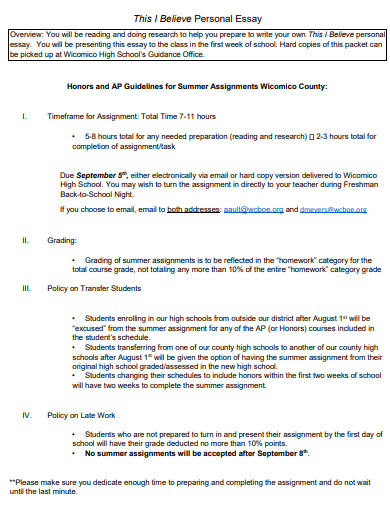
Size: 487 KB
2. Sample This I Believe Essay Example
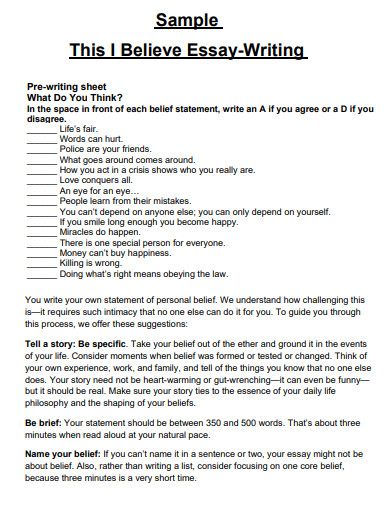
Size: 47 KB
3. Student This I Believe Essay Example
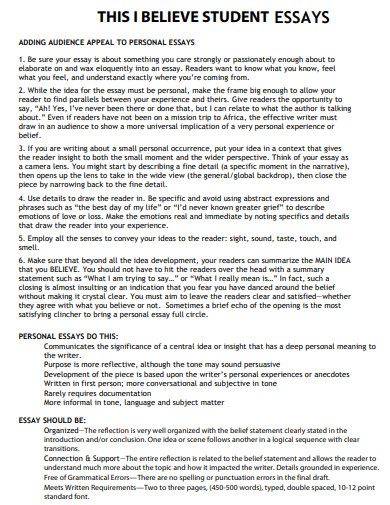
Size: 173 KB
4. Middle School This I Believe Essay Example
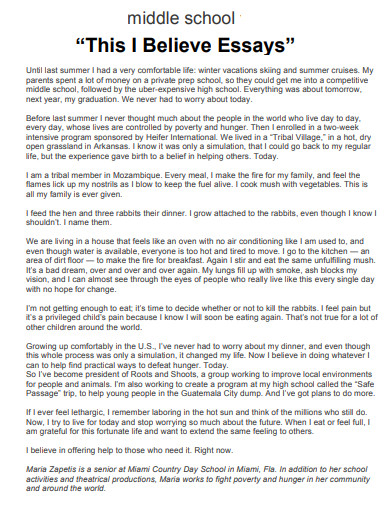
Size: 270 KB
5. This I Believe Essay Topic Example
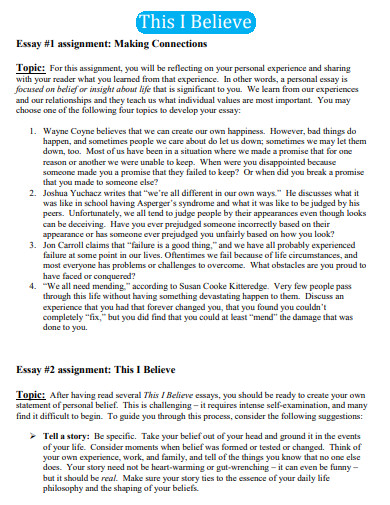
Size: 532 KB
6. This I Believe Essay Life Example
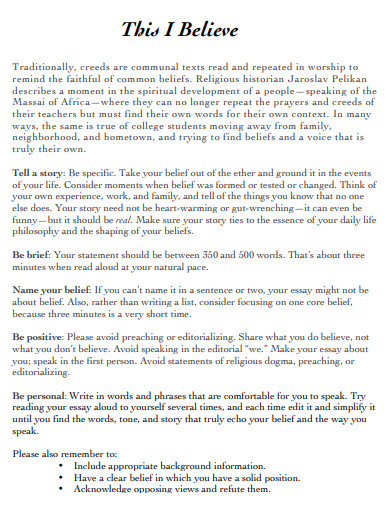
Size: 101 KB
7. This I Believe Essay Overview Example

Size: 67 KB
8. This I Believe Essay Steps Example
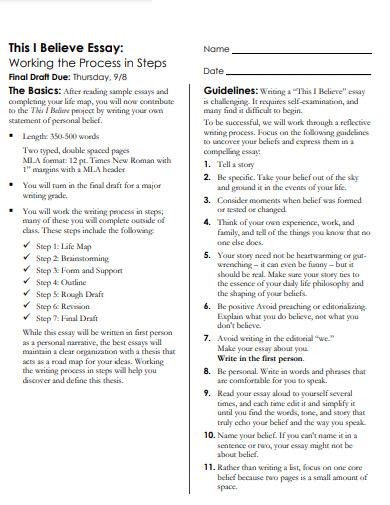
Size: 156 KB
9. This I Believe Essay Friendship Example
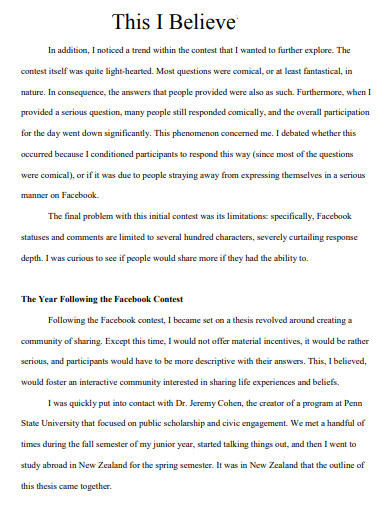
Size: 426 KB
10. Sports This I Believe Essay Example
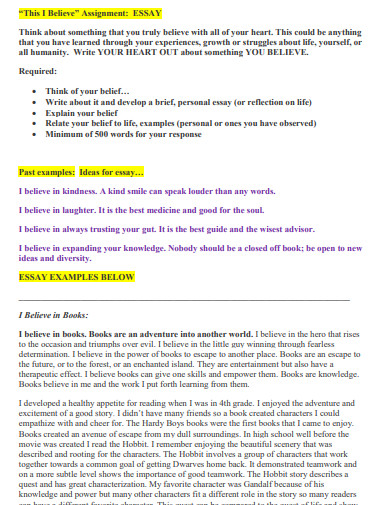
Size: 159 KB
11. This I Believe Essay Rubric Example
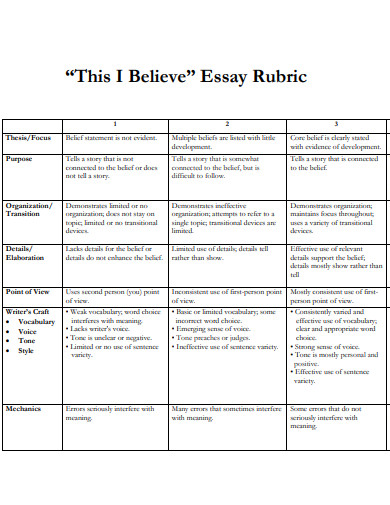
Size: 84 KB
12. This I Believe Personal Essay Example
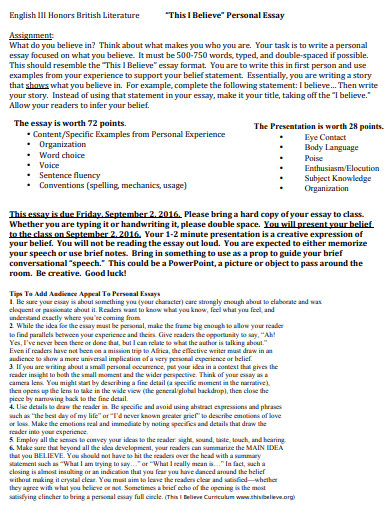
Size: 104 KB

13. This I Believe Essay Writing Example
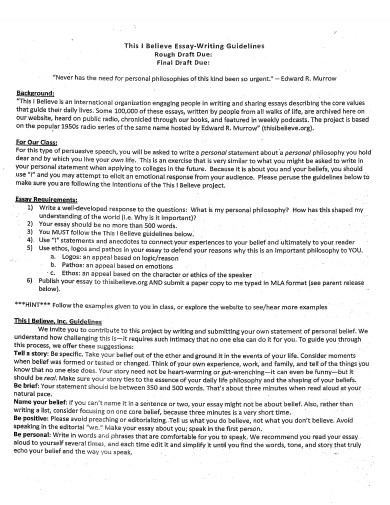
Size: 175 KB
14. This I Believe Essay Statement Example
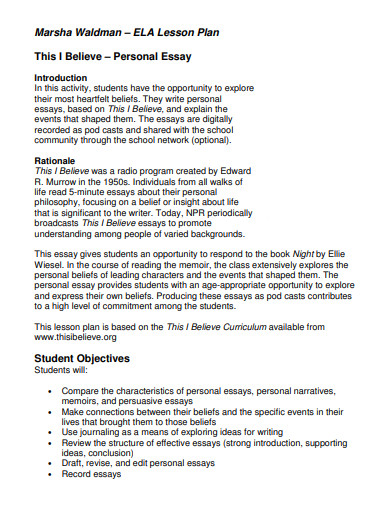
Size: 55 KB
15. God This I Believe Essay Example
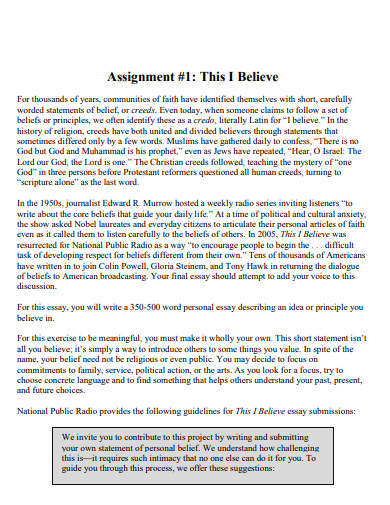
Size: 117 KB
16. This I Believe Essay Brief Example
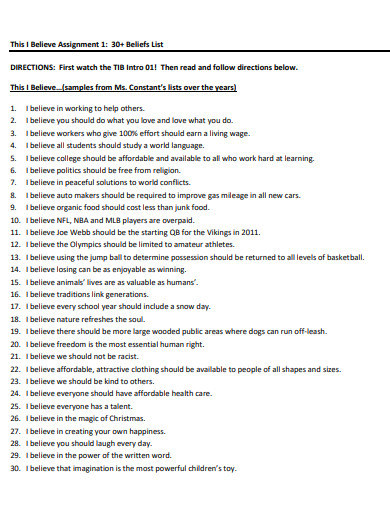
Size: 121 KB
17. This I Believe Essay Thesis Statement Example
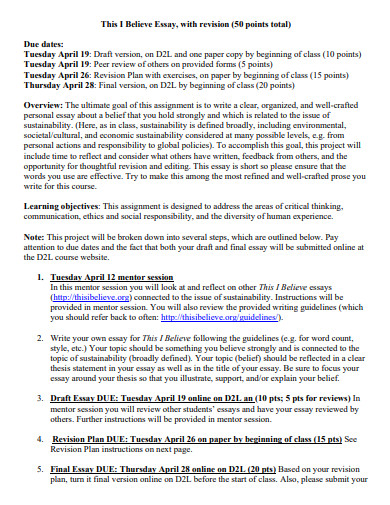
Size: 11 KB
18. This I Believe Essay Speech Example
19. this i believe essay college example.
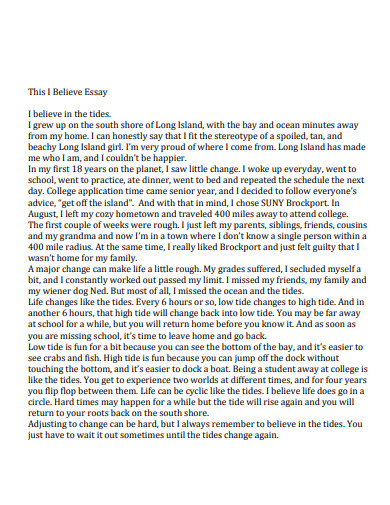
Size: 66 KB
20. This I Believe Essay Lesson Plan Example
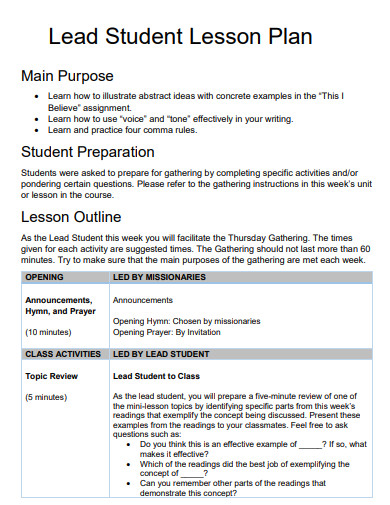
Size: 63 KB
21. This I Believe Essay Music Example
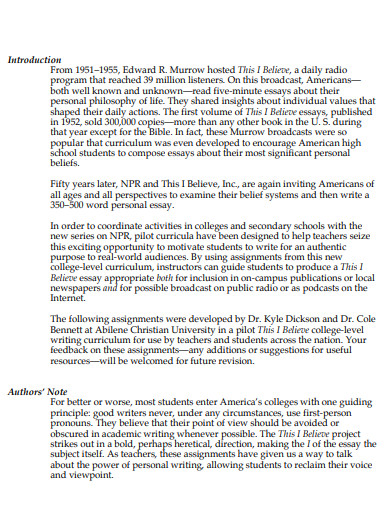
Size: 406 KB
22. Faith This I Believe Essay Example
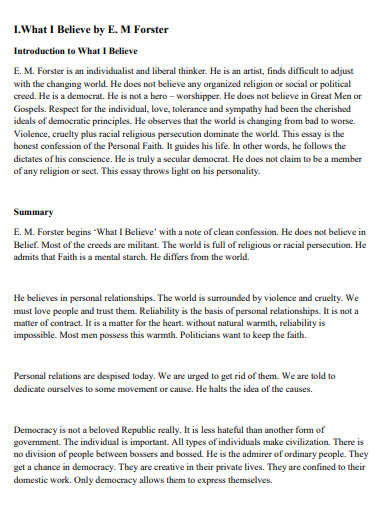
Size: 198 KB
23. Reflection This I Believe Essay Example
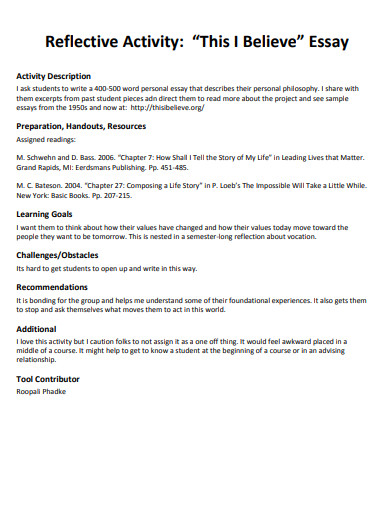
Size: 37 KB
24. This I Believe Immigration Essay Example
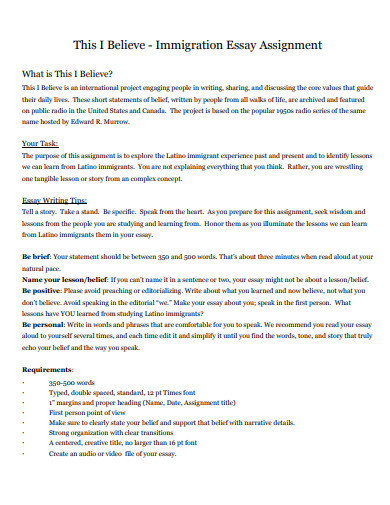
Size: 50 KB
25. This I Believe Love Essay Example
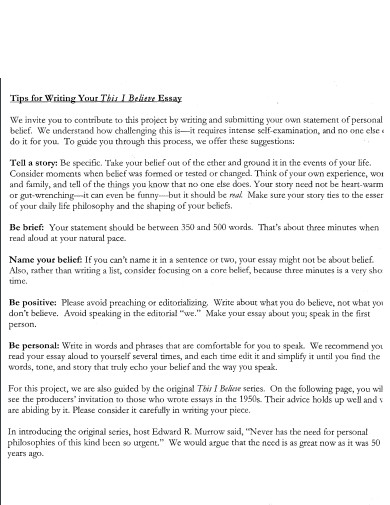
Size: 709 KB
26. This I Believe Dream Essay Example
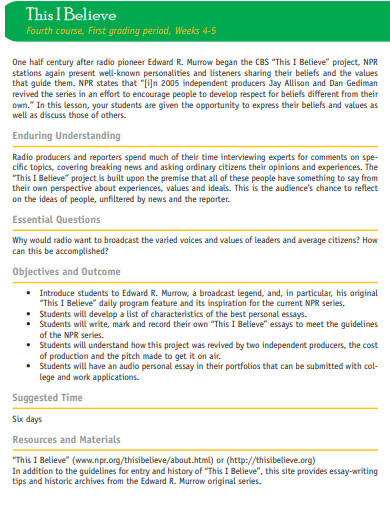
Size: 154 KB
27. This I Believe Power Essay Example
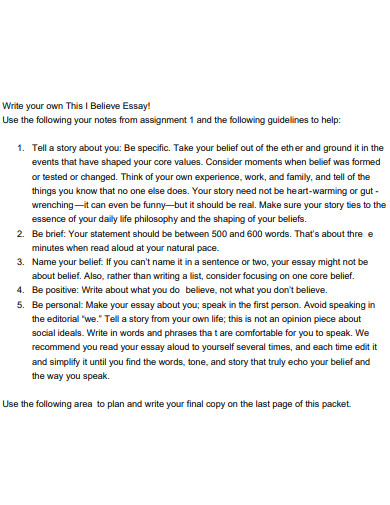
Size: 89 KB
28. This I Believe Essay Prompt Example
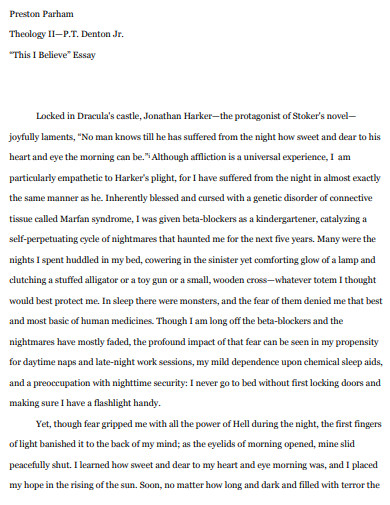
Size: 51 KB
29. This I Believe Essay Peer Review Example
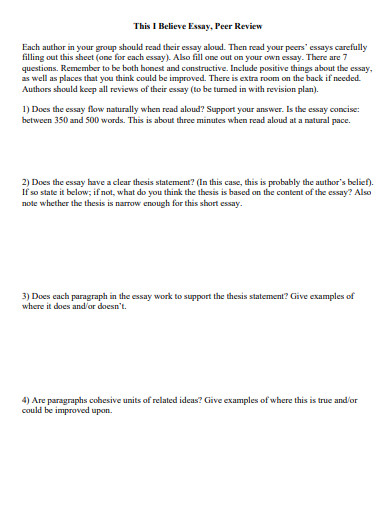
30. Elements of This I Believe Essay Example
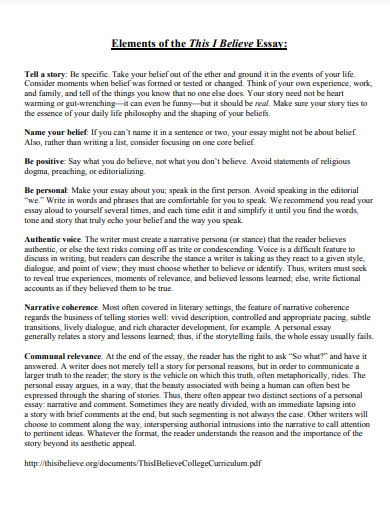
31. This I Believe Essay Transcript Example
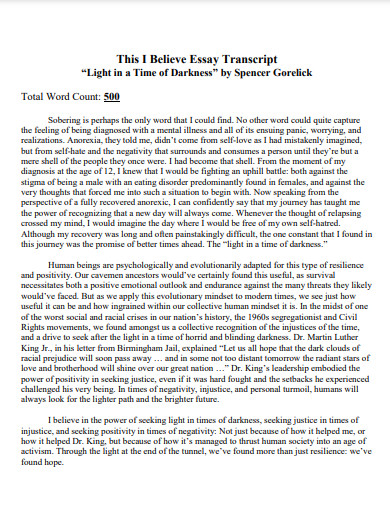
Size: 259 KB
What is a This I Believe Essay?
A This I Believe essay is a written composition that encapsulates an individual’s personal beliefs, values, and philosophies. Often reflective and intimate in nature, these essays offer readers insight into the author’s subjective understanding of the world. They provide an opportunity to explore the depth of one’s convictions, making use of various literary devices and characteristics to convey a sense of authenticity and sincerity. Through the exploration of individual experiences and convictions, these essays aim to connect with readers on a personal and emotional level.
How to Write a This I Believe Essay
Step 1: choose your core belief.
At the heart of your essay lies your core belief. Choose a belief that holds personal significance and represents your worldview. This belief should be something you feel passionately about and can articulate convincingly.
Step 2: Develop a Compelling Context
Create a context for your belief by providing background information. Explain why this belief is important to you and how it has shaped your experiences and outlook on life. A relatable context will engage your readers and make your essay more relatable.
Step 3: Employ Effective Literary Devices
Incorporate literary devices to enhance the impact of your essay. Metaphors, similes, and anecdotes can help convey your belief in a vivid and relatable manner. Consider how these devices can strengthen your narrative and connect with your audience emotionally.
Step 4: Craft a Strong Conclusion
Summarize your belief and its significance in your life, reinforcing the message you want to leave with your readers. Reflect on the journey you’ve taken them on and inspire them to reflect on their own beliefs.
Can I write about a commonly held belief?
Absolutely. While it’s important to maintain authenticity, even exploring a cliché belief can be powerful when you provide a fresh perspective or personal context. Your unique experiences and reflections make your essay stand out.
Can I use proper nouns in my essay?
Yes, proper nouns can add specificity and authenticity to your essay. Mentioning specific places, people, or events can help ground your beliefs in real-world experiences.
How can I make my essay more impactful?
Focus on using strong verbs to convey emotions and actions. Instead of saying “I felt sad,” consider saying “I crumbled under the weight of sorrow.” This adds depth to your writing and engages the reader’s senses.
In the realm of personal expression, the This I Believe essay shines as a vehicle for exploring one’s deepest convictions. By carefully selecting beliefs, weaving context, employing literary devices, and crafting strong conclusions, authors can create narratives that resonate with readers on a profound level. Through the power of words, these essays bridge the gap between individual experiences and universal truths, reminding us of the strength and diversity of human beliefs. So, take the plunge into introspection and share your beliefs with the world through the art of the This I Believe essay.
This I Believe Essay Generator
Text prompt
- Instructive
- Professional
Write a This I Believe Essay about the power of kindness in everyday life
Discuss in a This I Believe Essay how overcoming challenges has shaped your character

Want to create or adapt books like this? Learn more about how Pressbooks supports open publishing practices.
32 “This I Believe” Essay
The history of ‘this i believe’.
by Tanya Matthews
This I Believe is an exciting media project that invites individuals from all walks of life to write about and discuss the core beliefs that guide their daily lives. They share these statements in weekly broadcasts on NPR’s Morning Edition and All Things Considered .
The series is based on the 1950’s radio program This I Believe , hosted by acclaimed journalist Edward R. Murrow. Each day, some 39-million Americans gathered by their radios to hear compelling essays from the likes of Eleanor Roosevelt, Jackie Robinson, Helen Keller and Harry Truman as well as corporate leaders, cab drivers, scientists and secretaries — anyone able to distill into a few minutes the guiding principles by which they lived. Their words brought comfort and inspiration to a country worried about the Cold War, McCarthyism and racial division.
Eventually, the radio series became a cultural phenomenon. Eighty-five leading newspapers printed a weekly column based on This I Believe . A collection of essays published in 1952 sold 300,000 copies — second only to the Bible that year. The series was translated and broadcast around the globe on the Voice of America. A book of essays translated into Arabic sold 30,000 copies in just three days.
[The NPR series This I Believe can be read and heard here . In addition, the website and organization This I Believe houses thousands of essays written by famous people, such as the ones mentioned above, and everyday people like you and me.]
As a college student in 2020, you are faced with turbulent politics, socioeconomic issues, and ethical dilemmas that will challenge you to take a stand and contribute to the local, national, and global conversation around you. The purpose of this writing task is not to persuade you to agree on the same beliefs. Rather, it is to encourage you to begin the much more difficult task of developing respect for beliefs different from your own. Fifty years ago, Edward R. Murrow’s project struck such a chord with millions of Americans. It can do so again today…with you.
Video Resources for Generating Ideas
Dan gediman on writing a “this i believe essay”.
Read Cecelia Munoz’s essay “Getting Angry Can Be a Good Thing” referred to in the previous video here .
“This I Believe” Essay with Animation
“This I Believe” Essay Ideas
Prewriting Activity
1) analyze others’ statements.
Consider the following statements, written in response to the question What Have You Learned About Life? Highlight any sentences that resonate with you. Talk about them with a partner or group, explaining why. 1. I’ve learned that when I wave to people in the country, they stop what they are doing and wave back. – Age 9 2. I’ve learned that if you want to cheer yourself up, you should try cheering someone else up. – Age 14 3. I’ve learned that although it’s hard to admit it, I’m secretly glad my parents are strict with me. – Age 15 4. I’ve learned that if someone says something unkind about me, I must live so that no one will believe it. – Age 39 5. I’ve learned that there are people who love you dearly but just don’t know how to show it. – Age 42 6. I’ve learned that you can make someone’s day by simply sending them a little note. – Age 44 7. I’ve learned that the greater a person’s sense of guilt, the greater his or her need to cast blame on others. – Age 46 8. I’ve learned that no matter what happens, or how bad it seems today, life does go on, and it will be better tomorrow. – Age 48 9. I’ve learned that regardless of your relationship with your parents, you miss them terribly after they die. – Age 53 10. I’ve learned that making a living is not the same thing as making a life. – Age 58 11. I’ve learned that life sometimes gives you a second chance. – Age 62 12. I’ve learned that whenever I decide something with kindness, I usually make the right decision. – Age 66 13. I’ve learned that it pays to believe in miracles. And to tell the truth, I’ve seen several. – Age 75 14. I’ve learned that even when I have pains, I don’t have to be one. – Age 82 15. I’ve learned that every day you should reach out and touch someone. People love that human touch—holding hands, a warm hug, or just a friendly pat on the back. – Age 85 16. I’ve learned that I still have a lot to learn. – Age 92
2) Compose Your Own Statement
Write down a sentence that expresses what YOU have learned about life. Maybe it is similar to one of the statements above; maybe it’s completely different. Whatever it is, write it down.
3) Freewrit e
Now free-write about your sentence. Include at least two examples / experiences that you have had that support why you think this way.
Personal Statement/Philosophy: ______________________________________________________________________________________________________________________________________________________ Why do you believe in this statement? ______________________________________________________________________________________________________________________________________________________ Name two experiences that you had that would support the statement: _______________________________________________________________________________________________________________________________________________________________________________________________________________________________________________________________________________________________________________________________________________________________________________________ What does this say about yourself or your personality? _________________________________________________________________________________________________________________________________________________________________________________________________________________________________ After your life experience, how have you come to the conclusion that this should be your statement? How have your beliefs changed, if at all? ____________________________________________________________________________________________________________________________________________________________________________________________________________________________________________________________________________________________________________ How has the event effected your relationship with a person, place, or object? _________________________________________________________________________________________________________________________________________________________________________________________________________________________________ How does your statement apply to you today? (How you view yourself & society) ______________________________________________________________________________________________________________________________________________________
SAMPLE STUDENT ESSAYS
Sample #1: america’s beauty is in its diversity.
written by Alaa El-Saad, high school student, as heard on NPR’s Tell Me More (2009)
America is built on the idea of freedom, and there is no exception for Muslim women. I believe in the freedom of religion and speech. But mostly, I believe it’s OK to be different, and to stand up for who and what you are. So I believe in wearing the hijab.
The hijab is a religious head covering, like a scarf. I am Muslim and keeping my head covered is a sign of maturity and respect toward my religion and to Allah’s will. To be honest, I also like to wear it to be different. I don’t usually like to do what everyone else is doing. I want to be an individual, not just part of the crowd. But when I first wore it, I was also afraid of the reaction that I’d get at school.
I decided on my own that sixth grade was the time I should start wearing the hijab. I was scared about what the kids would say or even do to me. I thought they might make fun of me, or even be scared of me and pull off my headscarf. Kids at that age usually like to be all the same, and there’s little or no acceptance for being different.
On the first day of school, I put all those negative thoughts behind my back and walked in with my head held high. I was holding my breath a little, but inside I was also proud to be a Muslim, proud to be wearing the hijab, proud to be different.
I was wrong about everything I thought the kids would say or even do to me. I actually met a lot of people because of wearing my head covering. Most of the kids would come and ask me questions—respectfully—about the hijab, and why I wore it.
I did hear some kid was making fun of me, but there was one girl—she wasn’t even in my class, we never really talked much—and she stood up for me, and I wasn’t even there! I made a lot of new friends that year, friends that I still have until this very day, five years later.
Yes, I’m different, but everyone is different here, in one way or another. This is the beauty of America. I believe in what America is built on: all different religions, races and beliefs. Different everything.
Sample #2: The Essentials to Happiness
written by Alexxandra Schuman, high school student, as heard on The Bob Edwards Show (2013)
As a child, I was generally happy; singing and dancing to my favorite songs; smiling and laughing with my friends and family. But as far back as second grade, I noticed a “darkness,” about me. I didn’t enjoy engaging in many things. I didn’t relate to my peers in elementary school because they appeared so happy, and I didn’t have that ability to achieve happiness so easily.
In middle school things in my life began to get even worse. I began withdrawing from everything I once enjoyed; swimming, tennis, family. I hated going to sleep knowing I had to wake up to another day. I was always tired. Everything was horrible. Finally, midway through eighth grade, I was told I had a chemical imbalance; diagnosed with clinical depression and put on medication. It took months for me to feel the effects of the medication.
When I began to feel happy again, is when I realized that I had to take the responsibility for getting better myself, rather than relying on medication and therapy alone. Aristotle said, “To live happily is an inward power of the soul,” and I believe that this quote describes what I had to do to achieve happiness. Happiness is a journey. Everyone seems to need different things to be happy. But I believe people are blinded from what truly makes one happy.
Growing up, we’re encouraged to be successful in life; but how is success defined? Success and happiness are imagined now as having a lot of money. It is so untrue. Recently I went to Costa Rica and visited the small town of El Roble. I spent the day with a nine-year old girl named Marilyn. She took me to her house to meet her parents. It was obvious that they were not rich; living in a small house with seven children. The house was cluttered but full of life. Those who have decided that success and happiness comes from having money and a big house would be appalled at how utterly happy this family from El Roble is. People say that seeing things like that make you appreciate what you have, but for me, it made me envy them for being so happy without all the things I have.
“The essentials to happiness are something to love, something to do, and something to hope for,” a quote from William Blake sums up what I believe people need to realize to be truly happy in life. People need love; I feel they need their family and their friends more than anything in the world. People need work to do, something to make them feel they are making a difference in the world. People need to know that more good is to come in the future, so they continue to live for “now” instead of constantly worrying about the bad that could come. And most importantly people need to know that happiness is not something that happens overnight. Love and hope is happiness.
Sample #3: Find a Good Frog
written by Delia Motavalli, high school student, as heard on The Bob Edwards Show (2013)
I believe in finding a good frog. It seems that all throughout childhood, we are taught to look for a happily ever after. “And they all lived happily ever after”; isn’t that the conclusion to many children’s films? When I was a kid I always thought of that as magical; but now really it just seems unrealistic. And it teaches us that what we want is a fairytale like they have in the storybooks. We all want to be Cinderella who gets swept off her feet by the hot prince; we want to live in the royal castle, right? But I don’t think that’s necessarily a good thing for us to seek. Now I’m not saying I believe in being pessimistic, but I do believe in being realistic; it’s something I got from my mom.
My mother and I always have our best conversations in the rain. We sit in the car, neither of us wanting to brave the rain to get to the house. So we sit. We watch droplets race down the windshield, listen to the rain strike the roof of her little blue Honda, and feel the heater on full-blast rushing at our feet (just the way we like it). I don’t know why, but sitting in the car, we always talk more than normal. There was one rainy day when my mom told me something that is going to stick with me forever. Earlier that day she and my dad had been arguing about something; I can’t remember what. So she said, “Don’t spend your life looking for Prince Charming. Instead, find yourself a really good frog.”
At the time, I found this thought really disheartening. Who wants to think that you’ll never find Prince Charming? You’ll never get to be Cinderella? Another thought that struck my mind: if my mom says there’s no Prince Charming, then what’s my dad? A frog? I asked her, and she replied with, “Of course! If he were Prince Charming, he wouldn’t snore, would be able to cook, and we would never argue. But you know what? He’s a damn good frog.” Of course, being young, I didn’t think of the meaning behind what she was saying. I was too busy thinking of it literally, visualizing my mom as a princess and my dad in frog form.
But a few years later, I understand the value of my mom’s words. You can’t expect everything to be perfect. Let’s be completely honest; if you wait your whole life for your prince with flowing hair, statuesque features, and a white horse, you’re going to be lonely. I think that the point of finding a good frog is you accept something that’s great, flaws and all. It’s so easy to be picky. You can find the one tiny thing that’s wrong, and that one tiny thing is what you can’t get your mind off of. But in life, we can’t afford to wait years in vain for perfection. So I think that a good frog, an amazing frog, the best frog you can find is what we’re really looking for in this world. Don’t laze through life waiting for a happily ever after, because I don’t think you’ll be very happy with the outcome.
Examples from the ‘This I Believe’ Website
Be Cool to the Pizza Dude by Sarah Adams
They Lived Their Faith by Charles Henry Parrish
Returning to What’s Natural by Amelia Baxter-Stoltzfus
The Birthright of Human Dignity by Will Thomas
Remembering All The Boys by Elvia Bautista
I Am Still The Greatest by Muhammad Ali
A Goal Of Service To Humankind by Anthony Fauci
My Life Is Better by Abraham
Give Me a Waffle by Brenda
The Little Things by Sophie Crossley
You can also browse thousands more This I Believe essays by theme .
Prefer to Listen to Get Inspiration?
Check out This I Believe’s Podcast Series
4) Drafting
Assignment guidelines + suggestions and tips for drafting.
1. While the examples you’ve been given can serve as a model, it is essential that each of you write about a personal belief or philosophy that you feel strongly about. 2. Tell a story. Personal experiences are the corner stone of a good essay. Your story doesn’t have to be a heart breaker or even a major event, but it must be something that has affected how you think, feel, and act. List your personal experiences that you intend to use as evidence below: 3. Be concise. Avoid repetition. This essay should be between 500 – 650 words. When read aloud, it should take roughly four minutes. 4. Name your belief. It is essential that you can name your belief in a sentence or two. Focus on one belief only. This is your thesis. Write it here: 5. Be positive. Avoid preaching or persuading. You aren’t trying to change the way others think or act. Write about what you believe, not what you don’t believe. 6. Use the first person. Speak for yourself. Avoid using we or you. 7. Let your voice shine. Use language that sounds like you. Read it aloud as your revise. Keep making changes until your essay sounds like you and captures the essence of your belief.
5) Peer Review
Once you have written your first draft, arrange for your essay to be edited by a peer, using the following Peer-Editing Checklist: Writer’s Name: ________________________________________________ Peer Editor’s Name: ________________________________________________ Use your PENCIL or PEN (NOT red or green) to make corrections. Remember, this essay is a work in progress. You are not done writing! Look for ways to improve what you’ve already written. Tick each step if it has been completed. _____ 1. Read the paper backwards, one sentence at a time. Check for spelling errors. Use a dictionary, a friend, or a spell checker to find the correct spelling. _____ 2. Check for capitalized proper nouns and the first word of each sentence. _____ 3. Skip a line between each paragraph. _____ 4. Every sentence should have end punctuation. _____ 5. Check commas. Are they only used for compound sentences, a list of items, an introductory word or phrase, direct address, setting off interruptions, separating adjectives, or in dates? Do you need to add commas? Make sure you do not have commas separating complete sentences (i.e. comma splice errors that create run-on sentences). _____ 6. Apostrophes are used only for contractions and to show ownership. _____ 7. The use of more complex punctuation (dashes, hyphens, semi-colons, parentheses, etc.) is done correctly. _____ 8. Have you used commonly mixed pairs of words correctly? Check these: they’re/their/there, your/you’re, it’s/its, a/an, to/too/two, are/our/hour, and others. _____ 9. Read the paper backwards one sentence at a time. Check for sentence fragments and run-ons and correct them. _____ 10. Did you stay in present tense (such as is, am, do, take, know, etc.) or past tense (such as was, were, did, took, knew, etc.) throughout the entire essay? _____ 11. Did you stay in first person (I, me, my, we, us, our) or third person (he, him, she, her, they, them, their) throughout the entire essay? _____ 12. Was there adequate use of specific details and sensory details? Were the details clear and relevant to the statement? _____ 13. Is the overall purpose/philosophy clear? _____ 14. Does the conclusion make you go, “Wow!” “Cool!” “I never thought about it that way,” or any other similar reaction? Other suggestions for the overall content of the piece: ____________________________________________________________________________________________________________________________________________________________________________________________________________________________________________________________________________________________________________
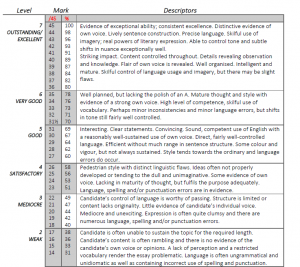
This I Believe by Tanya Matthews is licensed by CC-BY-SA
“This I Believe” Essay Copyright © 2020 by Liza Long; Amy Minervini; and Joel Gladd is licensed under a Creative Commons Attribution-ShareAlike 4.0 International License , except where otherwise noted.
Share This Book
Your current website browser is not supported for schlowlibrary.org .
That means the site will not appear or perform as intended..
- What you can do .
Having trouble or unsure about upgrading?
- Use the Centre County Federation of Public Libraries site for now.
- Contact us for further assistance.
This I believe : the personal philosophies of remarkable men and women
Add Tag No Tags, Be the first to tag this record!
- Add to List
- Export to RefWorks
- Export to EndNoteWeb
- Export to EndNote
- Similar Items
- Description
- Foreword / Studs Terkel
- Introduction / Jay Allison
- Be cool to the pizza dude / Sarah Adams
- Leaving identity issues to other folks / Phyllis Allen
- In giving I connect with others / Isabel Allende
- Remembering all the boys / Elvia Bautista
- The mountain disappears / Leonard Bernstein
- How is it possible to believe in God? / William F. Buckley, Jr.
- The fellowship of the world / Niven Busch
- There is no job more important than parenting / Benjamin Carson
- A journey toward acceptance and love / Greg Chapman
- A shared moment of trust / Warren Christopher
- The hardest work you will ever do / Mary Cook
- Good can be as communicable as evil / Norman Corwin
- A daily walk just to listen / Susan Cosio
- The elusive yet holy core / Kathy Dahlen
- My father's evening star / William O. Douglas
- An honest doubter / Elizabeth Deutsch Earle
- Have I learned anything important since I was sixteen? / Elizabeth Deutsch Earle
- An ideal of service to our fellow man / Albert Einstein
- The power and mystery of naming things / Eve Ensler
- A goal of service to humankind / Anthony Fauci
- The God who embraced me / John W. Fountain
- Unleashing the power of creativity / Bill Gates
- The people who love you when no one else will / Cecile Gilmer
- The willingness to work for solutions / Newt Gingrich
- The connection between strangers / Miles Goodwin
- An athlete of God / Martha Graham
- Seeing in beautiful, precise pictures / Temple Grandin
- Disrupting my comfort zone / Brian Grazer
- In praise of the "Wobblies" / Ted Gup
- The power of presence / Debbie Hall
- A grown-up Barbie / Jane Hamill
- Happy talk / Oscar Hammerstein II
- Natural links in a long chain of being / Victor Hanson
- Talking with the sun / Joy Harjo
- A morning prayer in a little church / Helen Hayes
- Our noble, essential decency / Robert A. Heinlein
- A new birth of freedom / Maximillan Hodder
- The benefits of restlessness and jagged edges / Kay Redfield Jamison
- There is no God / Penn Jillette
- A duty to heal / Pius Kamau
- Living life with "Grace and elegant treeness" / Ruth Kamps
- The light of a brighter day / Helen Keller
- The bright lights of freedom / Harold Hongju Koh
- The power of love to transform and heal / Jackie Lantry
- The power of mysteries / Alan Lightman
- Life grows in the soil of time / Thomas Mann
- Why I close my restaurant / George Mardikian
- The virtues of the quiet hero / John McCain
- The joy and enthusiasm of reading / Rick Moody
- There is such a thing as truth / Errol Morris
- The rule of law / Michael Mullane
- Getting angry can be a good thing / Cecilia Muñoz
- Mysterious connections that link us together / Azar Nafisi
- The making of poems / Gregory Orr
- We are each other's business / Eboo Patel
- The 50-percent theory of life / Steve Porter
- The America I believe in / Colin Powell
- The real consequences of justice / Frederic Reamer
- There is more to life than my life / Jamaica Ritcher
- Tomorrow will be a better day / Josh Rittenberg
- Free minds and hearts at work / Jackie Robinson
- Growth that starts from thinking / Eleanor Roosevelt
- The artistry in hidden talents / Mel Rusnov
- My fellow worms / Carl Sandburg
- When children are wanted / Margaret Sanger
- Jazz is the sound of God laughing / Colleen Shaddox
- There is no such thing as too much barbecue / Jason Sheehan
- The people have spoken / Mark shields
- Everything potent is dangerous / Wallace Stegner
- A balance between nature and nurture / Gloria Steinem
- Life, liberty, and the pursuit of happiness / Andrew Sullivan
- Always go to the funeral / Deirdre Sullivan
- Finding prosperity by feeding monkeys / Harold Taw
- I agree with a pagan / Arnold Toynbee
- Testing the limits of what I know and feel / John Updike
- How do you believe in a mystery? / Loudon Wainwright III
- Creative solutions to life's challenges / Frank X. Walker
- Goodness doesn't just happen / Rebecca West
- When ordinary people achieve extraordinary things / Jody Williams
- Afterword: The history of This I Believe: The power of an idea / Dan Gediman
- Appendix A: Introduction to the 1950s This I Believe radio series / Edward R. Murrow
- Appendix B: How to write your own This I Believe essay
- Appendix C: How to use This I Believe in your community
- Acknowledgments.
Other Authors
Allison, Jay. , Gediman, Dan. , Gregory, John. , Merrick, Viki.
Main Language
Belief and doubt.
Conduct of life.
Celebrities.

Book added to the bookshelf
Something went wrong and the book couldn't be added to the bookshelf. Please try again later.
Access our complete catalog for $ 8.99 .
By clicking ACCEPT, you are subscribing as 24symbols Premium Member and authorize a monthly charge on the day 17.
By clicking ACCEPT, you are subscribing as 24symbols Premium Member and authorize an annual charge on the day 4/17.

The God Who Embraced Me - A "This I Believe" Essay
John w. fountain.
Narrator John W. Fountain
Publisher: Macmillan Audio
- Body, Mind & Spirit
Are you sure you want to continue?
There was an error reconnecting. Please try again.
There is a session opened in another device.
To continue you must review and accept the permissions and mandatory policies (marked with *). If you need help or more information, contact us at [email protected]
- Please send me the verification email again
We tried to charge your subscription, but the payment failed. This is what your bank/card has told us:
If you want to continue your subscription, you may need to contact your bank, or you can change your payment information here:
Do you have any further concern? Write to [email protected] and we will help you out.

- Forgiveness
- Resurrection

- Evangelical
How Many Gods Do Christians Believe In?

How Many Gods Do Christians Believe in?
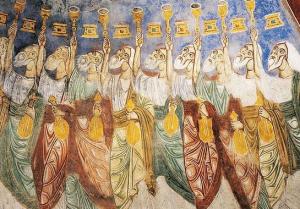
Titles generally require that all nouns begin with capital letters, but now I will revise the title of this blog post to correct it: “How many gods do Christians believe in?” Notice the difference.
And know that here I am not talking about Mormonism or Latter Day Saints. This essay focuses exclusively on evangelical Christians who are saying we should believe in more gods than God (Yahweh).
Two evangelical Christian influencers are in view here. I am not out to criticize them but only to raise theological discussion about their ideas. They are the late Old Testament scholar Michael S. Heifer and Messianic Jewish author and speaker Jonathan Cahn. Heiser’s best-known book on the subject is “The Unseen Realm” while Cahn’s best-known book on this particular subject is “The Return of the Gods.”
I have carefully selected essays and interviews for you to read to catch up on the essence of these men’s teaching about this subject in case you don’t want to buy and read their books.
For Heiser, read “Who Are the Elohim? The Answer Might Rattle Your Theology” at Logos Bible Software online. Just use a web browser/search engine to locate it. For Cahn, read “The Return of the gods-Part 1 (Transcript) at Dobson Digital Library. Again, use a browser or search engine to locate it. Both the interview and the essay are very easy to read and understand.
According to Heiser (and others), the Old Testament especially teaches that there are gods that are neither demons or fallen angels or the one true God Yahweh. These gods form an assembly over which the one true God, Yahweh, presides and judges. Heiser cites many Old Testament passages but especially Psalm 82 and 89. These “Elohim” are not equal with the Elohim Yahweh but are his creatures and heavenly inhabitants together with him. (For those of you who do not know, “Elohim” is a Hebrew word for god or God and can be either plural or singular. Heiser makes much of the fact that Psalm 82 uses the word both ways—for the heavenly assembly over which Yahweh presides and for Yahweh himself.)
Now, on to Cahn. Cahn seems to agree with Heiser, although I have found no evidence of dependence on him. According to Cahn, the gods and goddesses of ancient world, for example the Canaanite pantheon, were real and are real. They are not merely fallen angels or demons; they are something more. They seduced Israel to worship and/or serve them which led to Israel’s judgments by God. They are making a big “comeback” in the world today and Cahn’s special attention is on America which he believes is repeating Israel’s sin of idolatry and suffering the consequences.
What is the sin of idolatry in this case? Not believing in the gods or goddesses, but allowing them to become objects of worship, devotion, etc. And that does not always appear as explicit worship.
According to Cahn, these gods and goddesses are like “territorial spirits” who seek to dominate cultures. They did successfully dominate some ancient cultures and they reappeared in world history from time to time, unnamed and often unnoticed—as in Germany in the 1930s. They are reappearing and successfully dominating American culture today.
Several questions arise for theology. Why call these beings “gods?” Yes, that is one way of translating “Elohim,” but even if people believe in these beings, these spirits, doesn’t it confuse the biblical-Christian worldview of today to call them “gods?” Also, other than calling them “gods,” is there anything really new in Heiser’s or Cahn’s teaching? It seems so only in that they do not identify these spirits with fallen angels or demons, as most evangelical Christians have done.
Also, does this teaching (or these teachings) have any new practical implications for those who believe in and practice “spiritual warfare” (e.g., Greg Boyd and his followers)? Both Heiser and Cahn believe in and promote spiritual warfare (in different ways), but how does identifying these evil spirits change or help spiritual warfare?
Also, and finally, for now, do Heiser and Cahn believe there are still, now, today, gods forming a heavenly assembly who are not evil, pernicious, harmful? Who would they be? Does the New Testament talk about them? (Yes, Heiser in particular thinks so, in the Epistle of Jude.) What should we think of them? What should we do with them?
Remember, according to both Heiser and Cahn, these gods are not angels, fallen or otherwise. They constitute a kind of ontological or metaphysical beingness between Yahweh and even archangels such as Michael and Gabriel.
Your thoughts are welcome so long as they obey the rules here:
*If you choose to comment, make sure your comment is relatively brief (no more than 100 words), on topic, addressed to me (this is not a discussion board), civil and respectful (not hostile or argumentative), and devoid of pictures or links.*
- Uncategorized

- Library of World Religions
- Advertise With Us
- Write for Us
- Privacy Policy
- Terms of Service
- Do Not Sell My Data
- Radiant Digital
- Manage Newsletter Subscriptions
- Unsubscribe From Notifications
- Share full article
Advertisement
Abortion Is Dividing the ‘Religious’ From the ‘Right’
Does god have to be republican.
This transcript was created using speech recognition software. While it has been reviewed by human transcribers, it may contain errors. Please review the episode audio before quoting from this transcript and email [email protected] with any questions.
This is just my favorite kind of episode.
You’re doing the Lord’s work, my friend.
Aha. That’s what they tell you right before they string you up.
[MUSIC PLAYING]
From “New York Times Opinion,” I’m Michelle Cottle.
I’m Ross Douthat.
I’m Carlos Lozada.
And I’m Lydia Polgreen.
And this is “Matter of Opinion.”
All right, so this week, abortion landed in the spotlight again, reminding us just how much the issue of reproductive rights continues to rock American politics. So I’ve gathered you all here today for us to noodle over whether the latest developments in the fight over abortion access suggest religion is gaining or losing steam in the political arena. But first, someone’s going to have to walk us through the latest. Lydia, you want to tackle this for us?
I’m happy to. Well, it was an action-packed week. I mean, we always knew since the Supreme Court overturned Roe in 2022 that abortion was going to play a huge role in the 2024 presidential election. Obviously the Senate is up for grabs, the House. It’s going to be a big, big, big issue.
It’s a lot.
It’s a lot. And so this week, Trump, the wily politician that he is, took a big swing at diffusing what has become, I think, a very difficult and toxic issue for his party. And he announced in a video that, while he’s proud to have helped dismantle Roe v. Wade, he believes that abortion should be left up to the states. He thought IVF needs to be protected.
And he didn’t explicitly say that he was against a national ban. And there were a lot of other details that he left out that give him lots and lots of wiggle room, his favorite thing to have. But it was a big moment that happened on Monday. And then on Tuesday, the Arizona Supreme Court upheld a draconian ban on abortion that dated back to 1864 —
Pre-statehood.
Yeah, pre-statehood. Pretty amazing. Yeah. Women couldn’t vote back then, as you might recall. So —
Just to be clear, this ban was on the books in 1968 and 1969, which is the reason that the Supreme Court had it reversed. The Supreme Court ruled that because of Roe, the law that was on the books in Arizona in 1969 or 1970, when women had the right to vote —
Dating back to —
Which had originally been passed in 1864 —
Thank you, Ross.
— and had not been repealed in 1920, 1930, 1940 or 1950 was —
Got it. Point made.
— put into effect. I just think it’s useful to be clear. That’s all.
Thank you. I appreciate it.
Just here for clarity.
Very kind of you.
Arizona is, of course, a very important swing state. So this issue instantly became a hot potato. One of Trump’s acolytes, Kari Lake, who a couple of years ago said she loved this very old law, she’s currently running for Senate in Arizona and she’s tried to back away from it. She didn’t get any help from her fellow state Republicans because, on Wednesday, the Republican-dominated state legislature blocked a Democratic effort to repeal the 1864 law. So that’s about where things are.
You know how when Trump and his supporters talk about the economy under his watch during his presidency, they always act as if 2020 didn’t count, right, as if they can just go back in time and erase that year from his record as president?
On abortion, I see a similar kind of time travel, depending on what audience he’s trying to sway. And you see that clearly in that video statement. Like Lydia said, he doesn’t express support for a national abortion ban. He also doesn’t criticize the proposed state-level bans, even if they’re far more restrictive than his own prior stated preference for a ban after 16 weeks.
But even beyond those policy specifics, the rhetoric is very weirdly and artfully all over the map. He urges people to follow their heart and their faith, which sounds kind of like it’s a nod to Christian conservatives, but then he also says, do whatever is right for yourself, which sounds very —
— very kind of pro-choice-ish.
I missed that in the Bible where it says that.
Authentic — authentically Trump.
But yeah — but what’s clear is, exactly, is that Trump probably does not have hard and fast views on abortion himself and he says whatever he thinks will help him politically. But that doesn’t change the fact that he’s in a bind, right? He obviously sees that the efforts at abortion restrictions post-Dobbs have been very unpopular. But he also knows where his bread gets buttered on abortion. And the hard thing about trying to signal different things to different audiences is that everyone can hear you at the same time.
That’s true, although they sometimes hear you through different filters, and that has worked to his advantage a lot. Although, in this case, there were some staunchly pro-life political players who were not pleased. I mean, Mike Pence and Lindsey Graham and the Susan B. Anthony folks were expressing their disappointment over this. But on some level, does this matter if they’re unhappy with this particular thing?
Well, that’s — I mean, let me just to, I guess, quasi defend the specificity of Trump’s views. So afterward he was asked whether he would sign a national abortion restriction that crossed his desk. And I believe he said no, he would not. So he didn’t say that in the video, but he did clarify it when asked afterward.
And he also criticized the abortion law, which reflects, again, a certain incoherence. He was saying states should do whatever they feel like they should do, but then when a state law is reinstated that he doesn’t like, he criticized it. And Trump has been on the record criticizing the heartbeat bills, the kind that Ron DeSantis supported. Again, not in this moment, but in different contexts in the last year or so.
So I think you can look at Trump and say, pretty clearly, that Trump is, in a way, a classic conflicted voter on abortion. Again, not that he has any kind of deeply felt views. But you could talk him into a 15-week ban or a 20-week ban, and you probably couldn’t talk him into a six or eight-week ban. And again, without that being his absolute position, he’s sent enough signals, I think, that we can say that’s where he actually is.
But do you actually think you couldn’t talk him into pretty much anything? I mean, that’s the problem with him and the problem with paying too much attention to what’s in his heart really. When you’re talking about a pure opportunist, if the pressure from his congressional team or from his base was to go farther, why wouldn’t he?
I think if it suddenly became the case that heartbeat laws were very popular across America and 60 percent of the country supported them, Donald Trump would absolutely support them. But if you’re trying to pressure him from the pro-life side, I don’t think you have incredibly strong political leverage. I think it’s very clear, even before he came out with this statement, that most Republican senators in contested states were not themselves eager to pass a 16-week ban or even a 20-week ban.
So, yes, you could pressure him. But for the pressure I think to radically shift his perspective, the country as a whole would have to shift. Pro-lifers would have to show that they could win some referenda, for instance. So in this landscape, I think Trump’s positioning is likely to hold to some degree. That would be my guess.
The other thing that was notable to me was the two biggest political voices that came out were Lindsey Graham and Mike Pence. And Lindsey Graham is notable to me because of his incredibly poor track record of sticking to it when he criticizes Trump, right?
Folds like a cheap suit.
Yeah, no, he really does. And Pence, who I think is someone who has a very, very deep conviction on this issue, is so deep in the wilderness. I mean, he is the guy that Trump put on the ticket to prove his fealty to the pro-life position. It’s just kind of remarkable how far exiled he is from the beating heart of the Republican Party today.
Trump’s political needs are also very different now from the moment when he needed Pence or when he had — if you go back to 2016, he needed Evangelical voters not just to win the election, to even secure the nomination, right? And he needed Pence to win people over. He doesn’t need this voting base in quite the same way that he did back then. He can be — I don’t know if I’d call him a conflicted voter like Ross does. He can just be an opportunistic politician.
So there’s been a lot of talk about whether or not Trump’s going squishy on this is going to cause a rift among his white Evangelical supporters. And I just find this almost incomprehensible. And I think, in part, it’s because of how he has changed in terms of what he represents to those white Evangelicals.
I mean, originally he was a tool, right? He was going to give them their justices on the Supreme Court and he was going to give them their death of Roe. It was very specific, very transactional almost. But over the past several years, he has become almost their Messiah — if not their Messiah, then at least their prophet.
He has leaned all in into that, I am your representative. You are persecuted. I am your justice. He has tapped into the larger grievance of that community to a degree that it goes way beyond the specifics of what he can actually deliver for them to where it is a spiritual connection with a lot of these folks. And they are not going to abandon — he would have to do something truly egregious for them to abandon him.
I think the most honest moment in Trump’s video statement was when he said, “You must follow your heart on this issue. But remember, you must also win elections,” right?
: And so he recognizes that even as he’s become that figure for the pro-life movement, he’s very pragmatic about what it means for his own prospects.
And the irony in this is that when it comes to the two candidates’ own views, it’s the pro-choice Democrat who may be the one — who is the one with the more religious and philosophical qualms about abortion than compared to the Republican nominee. But that doesn’t matter, right? Biden says that Roe basically had it right. And Trump beats his chest about being the one who got rid of Roe.
So Evangelicals may — Mike Pence and others may wonder how deeply they can trust Trump on abortion, but they know they can’t trust Biden. And so I don’t see how it’s going to have a significant any kind of erosion of support for him, especially since he’s become this kind of messianic figure.
They can’t trust Biden. They also can’t trust the voters, right? I mean, the reality is that Roe, it turns out, may well be the compromise position on abortion, right? I mean that may be where America actually has landed on abortion.
First of all, I mean, I think talking about American evangelicalism as essentially a messianic cult for Donald Trump is a ridiculous overgeneralization about an incredibly diverse community of tens of millions of people that honestly we would never make about any other group.
And in fact, there are tons and tons of Evangelicals who still have a totally transactional approach to their support for Donald Trump, along the lines that Carlos is suggesting where it’s like, look, no matter what happens, Joe Biden supports zero pro-life policies. He supports legislation that is well to the left of where Roe actually was. And so if you are pro-life, what are you actually going to do? You don’t have to love Trump to have that perspective.
There’s also the reality — and this is why Trump did this now as opposed to four months ago when he was still in a semi-contested primary or four months from now when he will actually need pro-lifers to vote — he did it now because elections are fought at the margins. He didn’t want to alienate pro-lifers during the primary. And he doesn’t want to be seen as betraying them close to the election when it would be high in their minds.
Trump, in a really tight election, yeah, he’s obviously going to get 80 percent-85 percent of the white Evangelical vote no matter what. But he could lose the election if 200,000 people in a few swing states are pissed off about his abortion stance. So there is some risk for him. And again, this is why he’s doing it now and not earlier or later.
So here’s the question then, we can see why Trump needs the white Evangelical base clearly. But what about how is the era of Trump impacting religious conservatives and the conservative movement and their role in politics more generally, which, Ross, you had some very deep thoughts on, and I want you to unpack them after we take a quick break. So stick with us, everybody, and we’ll be right back.
All right, we’re back. Ross, you wrote a column this week coming off of Trump’s statement on abortion. You want to walk us through your thoughts on how all of this connects to the challenges facing the pro-life movement and religious conservatives in this moment?
Sure. I’ll just take an hour and 47 minutes and —
— run you guys through it.
We will be glued to you.
So trying to be very brief and glib, we were talking before about the extent to which the overturning of Roe and the return of the issue to the states has pushed American politics in a more pro-choice direction. I think that’s somewhat true and evident.
But it’s also true that if you look at polling on what people think about abortion and whether people think it should always be legal or sometimes be legal and so on, there’s a big shift that doesn’t start in 2022. It starts in the mid-2010s, around the time that Donald Trump becomes the leader of the Republican Party.
And I argued in the column that there is some connection here, that, essentially, having — if you are a idealistic and religiously-motivated movement that is trying to argue that you are defending the rights of unborn human life while also promising to protect women in a vulnerable state, having Donald Trump as opposed to someone else as your standard-bearer makes that argument seem less compelling to a lot of people who are on the fence about the issue. And I even suggested it might make it less compelling to people who vote for Trump.
People might vote for Trump because he’s a tough guy and a hard ass and is going to secure the Southern border. But they still wouldn’t trust him to figure out what you do about abortion ban exceptions for women who have miscarried or to save the life of the mother and so on. Would you trust Donald Trump to write that kind of legislation? You probably wouldn’t. So I think that is both a real force affecting politics for the last five to seven years, but also one that continues to be an issue, right?
I mean, you write about the need to protect women in a vulnerable time. But I have to say that I’m pretty sure what women want — most women want — is not male protection, but the autonomy to make their own decisions. And I don’t know that a politics that’s based on we’ll protect you in a vulnerable time is the need of the hour in this moment.
So I actually think there are problems with both as we stare down the 2024 election. And I think neither of them is especially appealing to the people that he needs to convince to vote for him.
I mean, that’s the pro-choice argument, right? And it may be that that argument just —
Which, by the way, is winning, just FYI.
All right, I want to take —
I mean, I’m just — wait, wait, wait, wait, just so — I’m obviously quite aware that the pro-choice argument is winning, and I never expected the overturning of Roe v. Wade to lead to abortion bans in more than a very few states. And it was always clear that the pro-life perspective was a minority perspective in American politics.
That said, I’m naturally quite interested, as someone who thinks that it’s wrong to kill unborn human beings in the womb, in arguments and politics that might persuade, if not you, my beloved fellow podcasters, then at least some people who are genuinely conflicted on the issue. And I do think an argument that says we’re here to help women and children has a more plausible chance of making that persuasion than the kind of arguments that Trump makes. That’s all I’m saying.
Ross, your column made the point that the pro-life movement has become deeply intertwined with Donald Trump and that he’s a lousy standard-bearer for a strident pro-life case. And I guess what I’m wondering is, why? In 2016, they had many options. They had many options who were more conventionally and plausibly pro-life candidates.
I mean, I think the argument that you can make is that once Trump was president, the pro-life movement should have, let’s say, thrown their weight behind one of the impeachment efforts and tried to get Mike Pence as president instead. You could make that kind of argument.
I mean, Marco Rubio and Ted Cruz were the two candidates of different flanks, different factions within the pro-life movement. The upper middle class, Whole Foods shopping pro-lifers liked Rubio. And Iowa Evangelicals liked Cruz. And if you go back and look at a lot of never — there were a lot of different kinds of never Trumpism, but a lot of never Trumpers were in different parts of the pro-life part of the party. Trump was very successful at rallying a different kind of voter.
And then once he was the nominee, you had a combination of the binary choice dynamic of American politics with, yeah, some of the dynamics that Michelle was talking about earlier, where you had parts of Evangelicalism developed this kind of religious narrative around Trump, especially in, I think, Pentecostalist parts of American Christianity. And we talk about white Evangelicals, but, in fact, if you look at like Hispanic Republicans, a lot of them are Pentecostalists.
So there’s a lot of different dynamics at play it’s partially being forced into it. It’s partially rationalizing something once you’re forced into it. It’s partially the kind of quasi religious bond that people form with their leaders. It’s a lot of different things at once. If the pro-life movement could wave a magic wand and make Ron DeSantis the Republican nominee, most of them would have. But that’s not what happened.
So we’ve landed in this spot. And so I now have certain concerns about — and this will sound odd from where we’re coming from, but I have certain concerns about what this is doing to the appeal of religion in a country where you’re having a rise of secularism and a loss of faith in all kinds of institutions. And I find the loss of broad religious faith in this country to be very troubling. I mean, I don’t think that’s a good thing to be hoping for.
But what we’ve seen with Trump, and even going back farther than Trump with a certain kind of militant Evangelical Christianity, is that it turns off people. People talk about how they are very turned off by the punitive, restrictive, backward-looking approach to what Christianity should be and what Trump is pushing.
But I think it is a real issue if by tying themselves to this really flawed, really toxic figure, that Christianity, especially white Protestantism, has linked itself in the minds of younger generations, in particular, with something that’s really negative. And for a church that is fighting to hold on to its voters, I mean, this is a broad problem, whether you’re talking about white —
You mean hold on to its parishioners —
Yes, hold on to its —
— not its voters.
— parishioners. Sorry, Freudian slip there.
Hold on to the faithful.
So this is something that it used to be that you were just looking at this as a problem in mainstream Protestantism, but it has made its way into more conservative groups as well. And so I do kind of worry what it’s going to mean for that side of this equation. They have definitely damaged the brand.
I mean, the good news, though, Michelle, is that liberals can prop up religion themselves just by going back to liberal Protestant churches and reviving them, right? So be the change —
But if you’ve damaged the whole idea —
— be the change you wish to see. Well, I mean —
But if you’ve damaged the whole idea of religion and increasingly religion is viewed as a Republican political arm, that’s a problem.
I’m sorry, I was being mildly facetious.
So, yes, I think — I mean, this is an argument that I have with my more pro-Trump religious conservative friends who basically say, look, you may hate Trump, but given how secular and socially liberal and hostile to religious liberty the Democratic coalition has become, you have no choice but to support him.
And I say, well, that works to a point, but you are also creating a version of the cultural effect that I think you’re describing correctly where there is — I mean, the thing about all these things is they’re very hard to measure. The trend towards disaffiliation predates Trump. Trump did not cause this. Everything in cultural and political life happens on the margins.
And it is important to stress that a big part of religious disaffiliation is not young, college-educated ex-Evangelicals turning against their parents religion. Those people exist. But a bigger part is working class Americans dropping out of religious life because they’re dropping out of other forms of life altogether. And a lot of those people are still voting for Trump.
Well, they still consider themselves religious.
So it’s a complicated — well, they identify — they still believe in God.
They just don’t go to church.
They still believe in God. Some of them. I mean, a lot of the so-called nones, people with no religious affiliation, are disaffected working class Americans who, yes, still say they believe in God, but aren’t congregationalists or Methodists or Catholics anymore, right? So that’s part of the story, too.
And Trump picks up disaffected voters who have left religion for one set of reasons and pushes some college-educated, younger Evangelicals maybe away from their parents churches too. But I agree — I agree it’s a big problem. I don’t think secular liberalism is doing that great either at the moment. But yes, it’s a real issue that the Trump era has exacerbated for religious conservatives.
Yeah, but I mean, look at the presidents of the 21st century, setting Trump aside. I think each of them give us a model of what it is to be a believer and to model a compassionate Christian faith, right? I mean, George W. Bush, the creator of PEPFAR, one of the most important humanitarian efforts that the United States has done in recent history to bring treatment for HIV and AIDS to Africa — his faith, I think, prompted him to want to end the civil war in Sudan, which his administration successfully did.
You had Barack Obama, who very much was a product of the Black church and culturally embodied those values of a certain kind of Christianity. You have Joe Biden who’s, I think, a very bog standard type of centrist Catholic. And it’s just it’s interesting to me that you look at that genealogy in the 21st century, you’ve actually had leaders who’ve modeled, to me, what feels like a very normal kind of Christianity, and I would say admirable kind of Christianity with different political inflections. And so Trump really is the very, very big outlier in all of that.
But that would seem to cut a little bit against Michelle’s argument, right? I mean, the most liberal forms of Protestantism are the mainline churches did not recover because Barack Obama modeled liberal Christianity and they haven’t recovered because Joe Biden has modeled liberal Catholicism. So that should make us a little more doubtful, I think, about the strength of this political effect, even as, again, I do think it’s real.
Carlos, your mouth is open.
Yeah, I know.
Yes, my mouth is open. Maybe I’m just hungry, Michelle.
Hungry — hungry for the truth.
Hungry for the word of God. We’re talking about a secularization of American life and a departure from churchgoing. And I wonder — I’m trying to understand the connection to politics with this because it’s also that politics has, in some ways, become a new religion.
It’s overlapping so forcefully with religious inclination. In the past, it was hard to identify someone’s political affiliation based on whether they went to church, right? Now it’s the overlap is enormous. It’s conservative Republicans.
And it seems that there are times in which religious observance and religious principle is defined by a series of positions on policy questions on abortion rights or on same-sex marriage. And I was thinking about this, Ross, in the context of a prior column that you wrote. I read you very carefully.
More carefully than I read myself.
And you wrote, for instance, that the left has a hard time being happy, in part because they’ve given up on God, right? I’m sort of simplifying that —
Yes, that was the simplified version.
Yeah. But when I read that, I immediately thought, I wonder if there’s an extent to which the right has held on — some portion of the right has held on to faith not by giving up on God, like you say the left has, but by somehow turning that faith into a political almost culture war tool.
Well, I also think that the, quote unquote, “being religious” gets a bit of a bad rap in being so closely associated with one idea of what it means to be religious. I mean, one of the cases that I’ve been following in this whole abortion saga is one in Indiana where Jewish women brought a suit saying that the very, very strict abortion ban there actually conflicts with their religious beliefs. And we’ve just been through Ramadan.
There are many, many different kinds of religious faith, both liberal, conservative, and everything in between. And I think that the overidentification with one specific kind of faith with politics is in itself kind of a problem.
One thing that could change that kind of identification is if more liberal people were religious. There certainly is a religious left. I grew up around parts of it. I went at times to churches that were connected to it. My own Catholic Church includes, obviously, lots of political liberals.
But the story of the last 40 years, nonetheless, is that the churches that are most associated with liberal politics have had the most trouble — conservative churches have had trouble, too. But it’s liberal churches have had the most trouble sustaining themselves and getting people to go to church.
So to the extent that you want — and I think you should want — religion in America to mean something more than just Southern white Evangelicalism or traditionalism in its various forms, you would need people who are liberal to be more religious. And, again, to generalize, in the aggregate, you’d need people to go to church or synagogue or their mosque.
There have been people raising the alarm and begging Democrats not to cede the field on religion. I mean, Hillary Clinton had somebody on her campaign whose entire raison d’etre was to reach out to liberal religious voters. I mean, this is kind of a perennial issue for them for years and years and years. But —
Again, I just want to point out that the past many, like, basically every Democratic president in my lifetime has been a professed believer. I mean, and now we have a presidential candidate who — does he believe in God, Donald Trump? I don’t know.
Yeah, but it’s not about — it’s not about the messenger. It’s about the outreach to the voters.
No, but this is — but it’s not about either. It’s about whether liberals go to church. Liberalism can be OK politically in a country that’s secularizing, but the fundamental issue driving the identification of conservative politics with religion is the fact that liberals, especially the well-educated liberals who set the tone for the culture, have decided to be in denial about the existence of God, to retreat into a vague agnosticism, and to not get up on Sunday or Saturday and go to church. That’s what’s driving the identification.
All right, but right now —
If you want the identification to stop, dear listener, go to church.
Ross is going to have a nosebleed soon.
No, I’m sorry, but we’ve just talked about the fact that there are all these Trump supporters who don’t go to church, right? I mean —
— I know you think they should go to church, too.
Fewer of them listen to this podcast. But dear Trump supporters who don’t go to church —
Get back there. You get in those pews.
— you should also go to church.
And while you’re at it, read the New Testament, people. It’s great.
I love it. I love it.
You know, it’s interesting, Ross’s challenge to the religious churchgoing left just because I know so many Catholic liberals, Dan Berrigan, Dorothy Day-type Catholic liberals who I went to college with at Notre Dame, who feel politically homeless and for whom this incessant overlap and identity formation between religion and politics is destructive. And I know that there are many reasons why they have a harder time getting up on Sunday, as Ross wants them to.
Yeah, and I guess I do think that there is a deep American tradition of separating religion from politics. And at least if they can’t be clinically separated, at least having some space and distance between them. And I think that we’re living in a moment of upheaval about the interpretation of the Constitution’s separation between religion and government. And I think that undoubtedly plays a role in all of this as well. It feels unsettling.
I think church and state is the division. Religion and politics will never be divided.
And on that spiritual note, we will close this discussion. And when we come back, we’re going to get hot and cold.
And we are back. And finally, huzzah, it is time for hot cold, where each week one of us shares something we’re into, over, or somewhere in between. So who’s got us this week?
I can do it.
I am at least warm towards Netflix’s big hit science fiction drama, “The Three-Body Problem,” which is adapted from a Chinese science fiction bestseller. It is — I actually don’t — I’m writing my newsletter about this, so there will be spoilers in the newsletter. But the way the show is structured, I don’t even want to say the most basic thing about what the story is.
Wait, you’re hot on it, but you’re not going to tell us anything about it.
All right, fine. It’s about aliens. Fine. It’s about aliens.
Of course, you like it.
Of course. No. But, yeah, it’s about interstellar conflict, but with a very interesting conceit for how — the shape this takes where basically there is an alien fleet that is on the way to Earth to conquer us, but it’s going to take them hundreds of years to get here. And in the interim, they have sent ahead forces, probes, technologies that are supposed to —
Not that kind, Michelle.
Go to church, Michelle. That are supposed to divide us, prevent scientific progress, all these kind of things, to basically keep us stuck in decadence. So the show is, in fact, a merger of two of my interests.
This is your sweet spot.
Decadence and stagnation and aliens. Now, unfortunately, I don’t think — the guys who did “Game of Thrones” are doing it. They’re very talented. They couldn’t land “Game of Thrones.” Looking ahead to the future books in this series, I don’t think they’re going to be able to land this one either.
Well, at least they have books to land on. That’s the —
They do. No, that’s true. But the books get —
Oh, they get weird?
The books get weird, yeah.
We just need a specialty on who can land series like this. There should be somebody out there who specializes in not having a lost ending.
The makers of “Succession” should be hired, brought in for series landings.
“Justified” is my bid for an ending.
Actually, every series should end with Tom Wambsgans taking power.
How does “Dune” end? Emperor Tom Wambsgans. Who wins the alien Earth war? Tom Wambsgans. That’s what I’m here for.
OK, well, there we go. I think that is what the takeaway from this week’s episode should be. Tom Wambsgans forever. Anybody disagree?
Yeah, he’ll decide our abortion policy too.
God is — God and —
God and Tom Wambsgans.
All right, then. Well, guys, thank you so much. This has been illuminating, inspirational even.
Thanks, guys.
Till next week.
See you then.
See you, guys. [MUSIC PLAYING]
Thanks for joining our conversation. If you liked it, be sure to follow “Matter of Opinion” on your favorite podcast app and let us know what big question we should think about next by emailing us at [email protected].
“Matter of Opinion” is produced by Sophia Alvarez Boyd, Phoebe Lett and Derek Arthur. It’s edited by Jordana Hochman. Our fact-check team is Kate Sinclair, Mary Marge Locker, and Michelle Harris. Original music by Isaac Jones, Efim Shapiro, Carole Sabouraud, Sonia Herrero, and Pat McCusker. Mixing by Pat McCusker and Carole Sabouraud. Audience strategy by Shannon Busta and Kristina Samulewski. Our executive producer is Annie-Rose Strasser.

- April 12, 2024 • 38:05 Abortion Is Dividing the ‘Religious’ From the ‘Right’
- April 5, 2024 • 38:40 Are Smartphones Just a Scapegoat for Our Unhappy Children?
- March 29, 2024 • 36:17 Finding the Line Between Celebrity and Politician With Tressie McMillan Cottom
- March 22, 2024 • 38:05 Obama, Trump, Pence: Revelations From Reading the Swamp
- March 15, 2024 • 36:00 What Do You Do if You Hate Both Biden and Trump?
- March 8, 2024 • 41:36 Trump 2.0: ‘A Blueprint for Retribution’
- March 1, 2024 • 37:16 The Pro-Life Movement Had a Plan Post-Roe. The G.O.P. Didn’t.
- February 23, 2024 • 38:30 Will the Economy Favor Biden or Trump? Paul Krugman Weighs In.
- February 16, 2024 • 34:40 The Presidential Fitness Test
- February 9, 2024 • 35:37 Our Super Bowls, Ourselves
- February 2, 2024 • 42:02 The Gender Split and the ‘Looming Apocalypse of the Developed World’
- January 26, 2024 • 36:53 Could Israel Cost Biden the Election?

Hosted by Michelle Cottle , Ross Douthat , Carlos Lozada and Lydia Polgreen
Listen to and follow ‘Matter of Opinion’ Apple Podcasts | Spotify | Amazon Music
This week, the “Matter of Opinion” hosts debate how religious voters will react to Donald Trump’s betrayal of anti-abortion positions, the evolution of Christianity as the domain of the right and whether religion is actually as powerful as it seems in modern U.S. politics.
Plus, Ross finds aliens, again.
(A full transcript of this audio essay will be available within 24 hours of publication in the audio player above.)

Recommended in this episode:
“ This Is Probably Not the Deal the Pro-Life Movement Bargained for With Trump ” by Ross Douthat
“ Can the Left Be Happy? ” by Ross Douthat
Thoughts? Email us at [email protected] .
Follow our hosts on X: Michelle Cottle ( @mcottle ), Ross Douthat ( @DouthatNYT ) and Carlos Lozada ( @CarlosNYT ).
“Matter of Opinion” is produced by Sophia Alvarez Boyd, Phoebe Lett and Derek Arthur. It is edited by Jordana Hochman. Mixing by Carole Sabouraud and Pat McCusker. Original music by Isaac Jones, Efim Shapiro, Carole Sabouraud, Sonia Herrero and Pat McCusker. Our fact-checking team is Kate Sinclair, Mary Marge Locker and Michelle Harris. Audience strategy by Shannon Busta and Kristina Samulewski. Our executive producer is Annie-Rose Strasser.
Follow the New York Times Opinion section on Facebook , Instagram , TikTok , WhatsApp , X and Threads .
Michelle Cottle writes about national politics for Opinion and is a host of the podcast “Matter of Opinion.” She has covered Washington and politics since the Clinton administration. @ mcottle
Ross Douthat has been an Opinion columnist for The Times since 2009. He is the author, most recently, of “The Deep Places: A Memoir of Illness and Discovery.” @ DouthatNYT • Facebook
Carlos Lozada is an Opinion columnist and a co-host of the weekly “Matter of Opinion” podcast for The Times, based in Washington, D.C. He is the author, most recently, of “ The Washington Book : How to Read Politics and Politicians.” @ CarlosNYT
Lydia Polgreen is an Opinion columnist and a co-host of the “ Matter of Opinion ” podcast for The Times.
- Search Please fill out this field.
- Manage Your Subscription
- Give a Gift Subscription
- Newsletters
- Sweepstakes
Slayings of 2 Kan. Women Involved Anti-Government Fringe Group Members and Custody Battle, Police Believe
Tiffany Machel Adams, 54, was reportedly a member of "God's Misfits," which authorities allege is an anti-government religious group
GoFundMe (2)
- Tiffany Machel Adams is reportedly a member of "God's misfits," an anti-government religious group, and a former local GOP chair, per reports
- Adams was allegedly in a custody battle with Veronica Butler, the mother of her son's children, per authorities
- Butler was scheduled to be granted unsupervised visitation with her children before she disappeared, investigators say
A grandmother and former politician who was among four arrested in connection with the murder of two Kansas women was allegedly in a bitter custody battle with one of the victims, according to authorities.
Tiffany Machel Adams, 54, of Keys, Okla., has been charged with several offenses, including murder, in connection with the killings of Veronica Butler and Jillian Kelley, who disappeared under “suspicious” circumstances on March 30, the Oklahoma State Bureau of Investigation said on Saturday.
Authorities launched an investigation when the car in which the women were traveling was found abandoned on the side of the road, Texas County Sheriff's Department said at the time.
On March 30, deputies responded to the site of the abandoned car and “found some things that just weren’t adding up,” prompting them to notify OSBI, Sheriff Matt Boley said at a press conference on Monday.
Hunter McKee of OSBI confirmed at Monday’s press conference, which was live-streamed by KFDA, that there was “significant physical evidence” at the scene of disappearance that indicated “foul play.”
On Saturday, Adams was arrested alongside her boyfriend Tad Bert Cullum, 43, Cole Twombly, 50, and Cora Twombly, 44, per the OSBI statement. All four have been charged with two counts of first-degree murder, two counts kidnapping and one count of conspiracy to commit murder.
Plea and attorney information were not available for the four suspects in online records as of Tuesday.
On Sunday, authorities discovered two bodies in rural Texas County in connection with the arrests but did not disclose the names of the victims, according to an OSBI statement.
Oklahoma State Bureau of Investigation/Facebook
During their investigation, authorities say they learned Adams, grandmother to Butler’s children, was allegedly embroiled in a bitter custody battle with the victim, the Des Moines Register , FOX 25 and WRHN reported.
Authorities said Adams is the mother of Butler’s former romantic partner, per the outlets.
Adams allegedly told police she spoke with Butler in the morning on March 30, when Butler was scheduled to pick up the children from her, the Des Moines Register , FOX 25 and WRHN reported, citing a probable cause affidavit. Police say that according to Adams, Butler told her she would not be able to make the pickup.
But when Butler did not return home that day, her family members grew concerned and notified police after they located her vehicle, per the affidavit, the outlets reported.
At a hearing scheduled for April 17, Butler was reportedly expected to be granted unsupervised visitation of the children, her lawyer told OSBI, per FOX 25 and the Des Moines Register .
Adams' son, the father of Butler's child, himself claimed that his mother would often keep his children away from him, the affidavit alleges, the Des Moines Register reported. Investigators say they reviewed recordings where Adams' son allegedly claimed that Adams and Callum had made death threats in connection with the custody issue, per affidavit, the outlet reports.
Adams is a former Cimarron County GOP chair, according to Republican leaders, the Des Moines Register reported.
The investigation revealed that all four suspects belonged to an anti-government religious group called "God's Misfits" and would meet regularly, per the affidavit, the Des Moines Register and FOX 25 reported. (The Facebook page for "God's Misfits" has made several posts denouncing the alleged crimes and refuting claims by police they are anti-government).
A teenager identified as a relative of Cora Twombly's allegedly told investigators that Cora said she and her husband Earl were headed out for a "mission" the day before the women went missing, per the affidavit, the Des Moines Register reported.
The teen allegedly said she was tasked with cleaning the couple's truck after they returned, and was told Butler and Kelley may have been put in a well, per the affidavit, the outlet reported.
Want to keep up with the latest crime coverage? Sign up for PEOPLE's free True Crime newsletter for breaking crime news, ongoing trial coverage and details of intriguing unsolved cases.
The teen also allegedly claimed the four suspects, and another man who has not been arrested, have been plotting the killing since February and one point decided to “throw an anvil through Butler's windshield while driving, making it look like an accident because anvils regularly fall off of work vehicles,” the affidavit alleges, the Des Moines Register reported.
Families of Butler and Kelley have set up GoFundMe fundraisers for the victims.
Related Articles

IMAGES
VIDEO
COMMENTS
Explore. Featured Essays Essays on the Radio; Special Features; 1950s Essays Essays From the 1950s Series; Browse by Theme Browse Essays By Theme Use this feature to browse through the tens of thousands of essays that have been submitted to This I Believe. Select a theme to see a listing of essays that address the selected theme. The number to the right of each theme indicates how many essays ...
Elie Wiesel's 'This I Believe': A God who remembers. Elie Wiesel, NPR. July 2, 2016 4:49 PM. Listen. Share. Elie Wiesel, in his office in New York. Bebeto Matthews. I remember, May 1944: I was 15 ...
Based on the NPR series of the same name, This I Believe features eighty essays penned by the famous and the unknown--completing the thought that the book's title begins. Each piece compels readers to rethink not only how they have arrived at their own personal beliefs but also the extent to which they share them with others
An inspiring collection of the personal philosophies of a group of remarkable men and women Based on the National Public Radio series of the same name, This I Believe features eighty essayists--from the famous to the unknown--completing the thought that begins the book's title. Each piece compels readers to rethink not only how they have arrived at their own personal beliefs but also the ...
3. This I Believe: The Personal Philosophies of Remarkable Men and Women. October 3, 2006, Henry Holt and Co. Hardcover in English. 0805080872 9780805080872. zzzz. Not in Library. Libraries near you: WorldCat. Showing 1 to 3 of 4 entries.
The God Who Embraced Me. I believe in God. Not that cosmic, intangible spirit-in-the-sky that Mama told me as a little boy "always was and always will be." But the God who embraced me when Daddy ...
That's the truth that sits within each of us: God made us all in his image and likeness. St. Francis De Sales said, "Be who you are and be that well.". To embrace all that we are - and to embrace each other with that love - is to embrace that image and likeness; it is to embrace God. 36 years of life and my short time as a Jesuit have ...
Ecclesiastes 3:11 says that God has put "eternity in the hearts of men," meaning that the longing for ultimate answers comes from God himself. God put that longing (the "God-shaped vacuum") inside the human heart to cause men to look to him. 3. Creation testifies to the Creator.
In this article, we will delve into the definition of a This I Believe essay, present a step-by-step guide on how to craft one, address common questions, and explore the essence of this expressive form. 1. High School This I Believe Essay Example. misswrighteng9.weebly.com. Details. File Format. Size: 487 KB. Download.
This I Believe is an exciting media project that invites individuals from all walks of life to write about and discuss the core beliefs that guide their daily lives. They share these statements in weekly broadcasts on NPR's Morning Edition and All Things Considered. The series is based on the 1950's radio program This I Believe, hosted by ...
When ordinary people achieve extraordinary things / Jody Williams. Afterword: The history of This I Believe: The power of an idea / Dan Gediman. Appendix A: Introduction to the 1950s This I Believe radio series / Edward R. Murrow. Appendix B: How to write your own This I Believe essay.
John W. Fountain reflects on the importance of fathers, both biological and divine, in 'The God Who Embraced Me', his contribution to NPR's This I Believe series. <br /> <br /> This I Believe is a National Public Radio program that features Americans, from the famous to the unknown, completing the thought that begins with the series title. The pieces that make up the program compel listeners ...
This I believe Essay believe that god has sent him into my life for reason. was young when fell in love with his fluffy brown hair and his big bright brown eyes. Skip to document. University; High School. Books; Discovery. ... I believe that God has sent him into my life for a reason. I was young when I fell in love with his fluffy brown hair ...
In this essay originally aired in the 1950s, legendary modern dance and ballet choreographer Martha Graham describes for NPR's This I Believe series what it means to be a dancer, "An Athlete of God".. This I Believe is a National Public Radio program that features Americans, from the famous to the unknown, completing the thought that begins with the series title.
1. This essay sample was donated by a student to help the academic community. Papers provided by EduBirdie writers usually outdo students' samples. Cite this essay. Download. Talking about whether I believe in God or not, yes I do believe in God and it is mentioned in my religion. I don't believe that there is only a superpower, I believe that ...
John W. Fountain reflects on the importance of fathers, both biological and divine, in "The God Who Embraced Me", his contribution to NPR's This I Believe series.. This I Believe is a National Public Radio program that features Americans, from the famous to the unknown, completing the thought that begins with the series title. The pieces that make up the program compel listeners to re-think ...
In John 14:13, Jesus taught us to pray in his name. To pray in Jesus's name means that it is his death in our place that makes it possible for God's wrath to be removed and God's grace to pour down all over us in answer to our prayers. So, Jesus's name refers to the basis or the foundation of every single gracious answer to prayer.
John W. Fountain reflects on the importance of fathers, both biological and divine, in "The God Who Embraced Me", his contribution to NPR's This I Believe series. This I Believe is a National Public Radio program that features Americans, from the famous to the unknown, completing the thought that begins with the series title.
This essay focuses exclusively on evangelical Christians who are saying we should believe in more gods than God (Yahweh). Two evangelical Christian influencers are in view here.
Explore. Featured Essays Essays on the Radio; Special Features; 1950s Essays Essays From the 1950s Series; Browse by Theme Browse Essays By Theme Use this feature to browse through the tens of thousands of essays that have been submitted to This I Believe. Select a theme to see a listing of essays that address the selected theme. The number to the right of each theme indicates how many essays ...
I believe in God again every time I go to this destination and there probably isn't another person...". What a beautiful treat to myself !!! I believe in God again every time I go to this destination and there probably isn't another person... | Instagram
transcript. Abortion Is Dividing the 'Religious' From the 'Right' Does God have to be Republican? 2024-04-12T05:03:08-04:00
I was head over heels for him. I remember one starry lonely night, it was raining, and thunderstorming. I opened my bible and began to read. In my head, I had an intuition. I wanted to know why God would put someone in my life, then take him out after falling for him? Oftentimes, I had blamed God for my mistakes, yet I soon realized, it was a ...
Slayings of 2 Kan. Women Involved Anti-Government Fringe Group Members and Custody Battle, Police Believe. Tiffany Machel Adams, 54, was reportedly a member of "God's Misfits," which authorities ...
00:00. 00:00. Basic to, and underlying all my beliefs, is my belief in God and the Bible, the only infallible guide for human conduct. Should I lose my belief in God, in Christ and the Bible, life would be meaningless, without further reason for existence. Concurrent with my belief in the fatherhood of God is my belief in the brotherhood of man.